- Motorhome Classes
- Travel Trailer
- Fifth Wheel
- Pop Up Camper
- Teardrop Camper
- Hybrid Camper
- Truck Camper
- RV Manufacturers
- Best RV Brands
- Buying An RV
- Backup Camera
- Electric Trailer Jack
- Portable Generator
- Portable Refrigerator
- Portable Solar Panel
- RV Power Cord
- RV Surge Protector
- RV Vent Fan
- RV Camping Chair
- Camping Table
- Portable Dog Playpen
- Propane Fire Pit
- RV Leveling Block
- RV Patio Mat
- RV Wheel Chock
- Wood Burning Fire Pit
- Portable Camping Toilet
- RV Black Tank Treatment
- RV Macerator Pump
- RV Portable Waste Tank
- RV Sewer Hose
- RV Shower Head
- RV Toilet Paper
- RV Water Pump
- Towed Vehicle Braking System
- Weight Distribution Hitch
- 12-Volt Air Compressor
- Collapsible RV Ladder
- Discount Camping Club
- Good Sam Club Membership
- Portable Propane Heater
- RV Mattress
- RV Step Cover
- Quick Reviews
- Full-Time RV Living
- RV Upgrades
- RV Boondocking
- Public Lands
- Overnight RV Parking
- Amazon Storefront
- Best RV Water Filters
- Must-Have RV Accessories
- Travel Trailer Accessories
- Pop-Up Camper Accessories
- RV Kitchen Accessories
- Luxe RV Accessories
- Gifts For RV Owners
- RVers Online University
- Talk To RV Mechanic
- About Camp Addict
- Events & Press
We may earn money when you make a purchase via links on this page. Learn more
- Camp Addict
- 🏕️ What Is Tongue Weight

What Is Tongue Weight & How To Measure It
By Marshall Wendler
Tongue weight is an often overlooked and misunderstood travel trailer measurement, and there can be severe consequences if it isn't paid attention to.
There is more to towing a travel trailer than hitching up and heading out. You need to load the rig correctly, so it is appropriately balanced while going down the road; otherwise, the handling can be compromised and may lead to an accident.
On this page, you will learn how to measure tongue weight and find out what an acceptable trailer tongue weight is to safely tow your recreational vehicle down the road as you head out on your next grand adventure.
What Is Tongue Weight?
Let's start by first answering the question, "What is the tongue of a trailer?"
A trailer tongue is the part of the trailer frame that attaches to the tow vehicle's hitch. It is typically a "V" shape, with the pointy end of the "V" being the part that attaches to your vehicle.
Travel Trailer Tongue
The amount of downward force that the trailer's tongue (hitch attach point) exerts on the rear of the tow vehicle (trailer hitch) is called "tongue weight."
Tongue weight is something that RV designers take into consideration when they design a rig's layout. Where they place interior furnishing, appliances, slides, and even where they position the trailer's axle(s) directly impact tongue weight.
Also, how you load your RV will affect the weight at the trailer hitch. Put too much heavy stuff at the rear of the trailer, and tongue weight is lowered. Load up the front of the rig, and the weight applied at the hitch increases.
Some trailers are more sensitive to how they are loaded and will be significantly impacted by where you put stuff and even if the water and waste holding tanks are full or empty.
My Trailer's Water Tank Is Forward Of The Axles
I've weighed my 24-foot travel trailer with both full and empty water tanks (the tank is forward of the axles), and there is a noticeable difference in the tongue weight measurement.
Having the proper tongue weight ensures the stability of your towed trailer as you head to your favorite camping spot. Take the time to understand how to calculate tongue weight so that you don't endanger yourself and others as you tow your home away from home down the interstate.
Tongue Weight vs. Hitch Weight
Is Hitch Weight The Same As Tongue Weight? While both terms are often used interchangeably, they aren't necessarily the same.
Tongue weight is the weight of the trailer that isn't supported by the trailer's axle(s). In other words, as explained above, it is the downward force exerted on the tow vehicle's hitch. This force is applied where the front of the travel trailer (tongue) attaches to the hitch ball.
Hitch weight is the tongue weight PLUS the weight of the hitch itself. So this is the total weight that is being applied to the tow vehicle's hitch receptacle (where you 'plug' in the hitch equipment to the vehicle you are using to tow your trailer).
There is an engineering standard that tow ratings (including tongue weight ratings) are calculated - SAE J2807 (initially issued in April 2008, so older vehicles won't comply with it). This standard allows for a certain weight for hitch equipment: 55-75 pounds depending on the maximum tow weight ( source ).
SAE J2807 Testing Briefly Explained
If your tow hitch weighs more than the allowed amount, the difference must be included in the hitch weight. Most weight distribution hitches fall within the allowed amount, so tongue weight is the same as hitch weight.
However, some hitches weigh considerably more than the allowed amount. For example, I use the Hensley Arrow hitch, which is 160 pounds. So I need to include the additional weight in the hitch weight calculations.
Heavy Hensley Hitch
Why Is Proper Tongue Weight Crucial?
Improper tongue weight can damage the tow vehicle or cause loss of control due to trailer sway. Read on to learn about what happens if you have too little tongue weight or too much.
If the camper tongue weight is too light, there will be insufficient downward pressure where the trailer connects to the tow vehicle (aka the trailer coupler). This can cause trailer sway (or fishtailing), which can compound/amplify until you lose control, resulting in a crash.
Low weight at the front of the trailer can lead to bouncing (porpoising) your entire setup when you go over bumps or uneven pavement. This can unload the rear of your tow vehicle, resulting in loss of control, or at the very least, it makes for an uncomfortable ride.
In extreme circumstances, too little weight at the tongue of your trailer can also cause the front of the rig to lift, which raises the rear of your vehicle, reducing the grip/control of its rear tires.
See the below video to see what can happen when the tongue weight of your trailer is below what it should be.
To correct low tongue weight, you can make sure that you only travel with full propane tanks (assuming they are upfront) and change the way the interior is loaded, moving heavier items forward.
If the weight at the tongue of the trailer is too much, excessive force can be exerted at the rear of the tow vehicle, potentially overloading the rear axle.
Too Large Trailer Resulting In High Hitch Weight and Tow Vehicle Squat
This can cause premature tire wear, tire blowouts, damage to the rear suspension, and if the weight distribution hitch isn't set up right, unloading of the front of the vehicle can result in steering control and braking problems.
Also, having the front of the trailer excessively heavy can mean that you exceed the maximum tongue weight of your tow vehicle, especially if you are already close to the max.
How To Adjust
If your trailer suffers from too high or low tongue weight, you must adjust it before hitting the road.
In theory, the trailer designers properly configured the layout so that tongue weight should be within the proper range when the rig is empty. Therefore the items you place inside will directly impact the weight.
The good news is if this is the case, you should be able to move stuff around to ensure that tongue weight is where it should be.
If the front of the trailer is too heavy, you will need to remove weight from the front of the camper or add weight to the rear (or a combination of both).
The freshwater tank of my camper is ahead of the axles, so when it is full, the tongue weight is increased. I try not to travel with a full fresh tank for this reason (plus, who wants to spend gas dragging water around if you don't have to?).
You may have to relocate heavy lead acid batteries, typically at the front of the trailer, or replace them with much lighter (but more expensive) lithium batteries.
Weight At The Tongue
Also, be aware of what you put inside any forward storage bays. Heavy cargo here will increase the weight at the front of your rig.
If there isn't enough weight 'pressing' down at the front of the camper, you will need to shift the interior load forward. Or put some heavier items in any available front storage bays. Or add another heavy battery to the front.
Keep in mind that you want to shift the weight in relation to the trailer's axle(s). Adding weight behind the axle(s) will decrease the weight at the front, and adding weight ahead of the axle(s) will increase the weight at the front.
How to Calculate Trailer Tongue Weight Ideal Range
The ideal range for a trailer's tongue weight is between 10 and 15 percent of the actual weight of the trailer. This is the loaded trailer weight when you are heading out to go camping.
Ideally, you will want to aim for closer to 12%, but you have the range of 10-15% to fall into.
It is not a percentage of the gross vehicle weight rating (the maximum weight the trailer can be) unless your trailer loaded for a typical trip is right at the max weight (not a good thing).
You will need to load your trailer up as if you were going camping and then weigh your trailer. Then you will measure your trailer tongue weight. You can get both of these weights at the same time.
Load Your Rig As It Would Be For A Typical Camping Trip
Once you have this measurement, you multiply the weight of your trailer (previously measured) by 12% (the ideal weight) to see what the weight of your trailer tongue should be. Compare it to what you measured it to be.
If the stars are aligned in your favor, it is within the desired range. If not, make necessary adjustments and recheck.
Why You Need To Determine Tongue Weight
The recreational vehicle manufacturer will publish a tongue weight for your particular model and floor plan. Why can't you use this number and call it a day?
While the manufacturer goes through the steps necessary to determine the tongue weight, they don't necessarily do it on each unit. Yes, two rigs that are the same floor plan and model can have different overall weights due to varying options or a change in the supplier of appliances, etc.
Proper Weight Distribution Is Crucial
Also, a factory tongue weight measurement is done on an empty trailer with no water in its tanks, no personal belongings, and empty propane tanks. Plus, with many rigs, the house batteries are added by the dealer, and since they are frequently at the front of the RV, they are a big contributor to the weight at the front.
In other words, the weight that the factory uses is often nowhere close to the weight of the RV as it is when you are towing.
So you MUST determine your actual trailer's weight.
How To Measure Trailer Tongue Weight
There are four ways to measure your travel trailer's tongue weight:
- Commercial scale
- Bathroom scale
- Tongue weight scale
- Weigh Safe Ball Mount
Of these methods, only one (commercial scale) allows you also to get the gross trailer weight (loaded weight) which you need to know to calculate tongue weight. Therefore, the Commercial Scale method is our top pick.
Commercial Scale Method
Once you have located a commercial scale (located at truck stops) and verified they would let you weigh your recreational vehicle, it's time to get busy!
Below we show you what steps to take if you only want to determine trailer tongue weight, but we strongly suggest you also figure out your trailer weight simultaneously. You will need this measurement to calculate proper tongue weight.
- We show you how to weigh the trailer and tongue using a commercial scale on our how to weigh a trailer page.
Typical Commercial Scale
Trailer And Tow Vehicle On Scale
Figuring Out Tongue Weight Only
This requires two separate weighings. One with the trailer connected to your tow vehicle and one with just the tow vehicle (trailer not connected).
For the first weighing, press the call button and tell the clerk that this is your first weight.
They may ask you for your truck number. Just tell them that you are an RV.
Then, when taking your second weighing, be clear that this is a re-weigh.
Evidently, you may be charged the full price for the second weighing (re-weighs are usually cheaper) if you don't mention this.
- I always go inside and talk to the weighmaster before I pull up on the scale just to let them know what I'll be doing so that there isn't any confusion and I don't have to explain myself via the intercom system.
Weigh As Follows:
- Weigh your tow vehicle with the trailer attached. Position your setup so the trailer axle(s) are on one weighing pad and your tow vehicle's axles are on another. This will give you two separate weights on the printout you will get at the end. When checking tongue weight only, you don't care about the trailer weight number - just the tow vehicle's weight. This is weight A .
- Drive off the scale and detach your trailer from your tow vehicle. Drive JUST the tow vehicle back onto the scale, ensuring it's on just one weighing 'pad.' (Tell the scale operator this is a 're-weigh' so you don't get charged the full amount for a second weighing.) This is weight B .
- Collect your weighing slips from the scale operator (you will get two slips). It's time to do the math! Subtract weight B (tow vehicle without a trailer attached) from weight A (tow vehicle with the trailer attached) to get the tongue weight.
How Do You Calculate Tongue Weight?
Calculating tongue weight is as simple as taking the two weights you figured out above and performing this simple calculation: Weight A - Weight B = tongue weight .
It's that simple!
Bathroom Scale Method
For this, you will need:
- A brick (or block of wood) the same thickness/height as your scale.
- Two small steel pipes.
- Bathroom scale.
- A piece of wood (4x4 preferably) at least 4 feet long.
Do this on a level surface!
The above chart pretty well explains how to set up your scale system. Additionally, you can view the video directly below to see the process demonstrated.
The main constant is that you must put the tongue 1-foot away from the end that doesn't have the scale. The other side can be 2, 3, or even 4 feet away from the tongue.
Keep it at a 2-foot minimum. The spacing you choose determines how you do your math.
If you use the above scenario, you use a 2-foot scale-tongue gap and a 1-foot block-tongue gap.
Therefore, you have a 2:1 ratio. This means that the scale will only support 1/3 of the tongue weight.
- When using this method to figure out tongue weight, make sure that the trailer is level when taking the measurements, and that the 4x4 piece of wood is also level. Being level is the key to an accurate measurement.
In our example, where you use a spacing of 2 feet and 1 foot, you add the two distances together, which is three.
This is your multiplier. Your math will be to multiply what the scale says by three.
For example, if the scale says 220, then 220 x 3 = 660. Therefore your tongue weight is 660 pounds.
Say you use three feet in between the tongue and the scale, then you have a 3:1 ratio and will multiply the scale reading by 4 (3+1).
Thankfully, it's pretty simple math.
This method aims to keep the tongue weight from being directly on the scale and breaking it.
Most average-sized travel trailers will have more tongue weight than a typical bathroom scale can handle.
Measuring Tongue Weight With A Bathroom Scale
Tongue Weight Scale Method
These scales are made just for this purpose but can be pricey.
They are simple small scales made to take the weight of a trailer tongue up to the number of pounds they are rated for.
Place the tongue weight scale under the trailer coupler (you will have to use blocks to bring up the scale to the level of the coupler - see video below). Lower the trailer using the tongue jack until the entire weight is on the scale, and look at the reading.
When taking this measurement, you will want the trailer to be level from fore to aft.
Using A Sherline Scale
This is the simplest way of determining tongue weight, but it won't give you the actual weight of the trailer, which you need to calculate the actual tongue weight range for your exact trailer.
Weigh Safe Ball Mount Method
The Weigh Safe Hitch is a hitch with a built-in scale. It's as simple as that. You connect the trailer to the hitch, and you see the weight.
You have a reasonably accurate trailer tongue weight showing in the trailer hitch itself.
This option will be more expensive than the other methods but is also helpful as your tongue weight can change with varying cargo, water, and propane levels.
- This hitch isn't compatible with any of the reviewed weight distribution hitches . It can be used to tow a trailer that doesn't require a weight distribution hitch. Unless you need such a hitch, this would be an expensive way to figure out tongue weight.
Using A Weigh Safe Hitch
Frequently Asked Questions:
Does a weight distribution hitch reduce tongue weight.
No, a weight distribution hitch doesn't reduce the measured tongue weight. This is because when you are measuring tongue weight with a weight distribution hitch, you do so when the hitch is not in weight distribution mode.
In other words, the hitch spring bars (or chains) are not under tension, and the hitch is not distributing weight.
It is true that when the weight distribution hitch is in towing configuration (distributing weight), it is redistributing some of the hitch/tongue weight (tow vehicle rear axle loading) to the front axle of the tow vehicle, and to a lesser degree, the trailer's axle(s).
However, the correct way to determine (weigh) tongue weight is to do so when the weight distribution hitch isn't distributing rear axle/hitch weight, so the hitch itself doesn't change the measured tongue weight.
What Happens If Trailer Tongue Weight Is Too Heavy?
If the tongue weight is too heavy, you can overload the tow vehicle's rear axle, which can result in a loss of control.
Learn more by reading the above section .
Can Too Much Tongue Weight Cause Trailer Sway?
No, too much tongue weight doesn't cause trailer sway. The opposite is true: Too little tongue weight causes trailer sway.
See the above section for more about this .
What Is The Recommended Tongue Weight On The Hitch Of The Towing Vehicle?
The recommended correct tongue weight is between 10 and 15% of the actual (loaded) weight of the trailer. The ideal tongue weight would be about 12% of the trailer weight.
Is 10% Tongue Weight Enough?
You want tongue weight between 10 and 15% of the actual trailer weight, so yes, 10% is enough, but on the low end. Ideally, you want approximately 12% of the actual trailer weight to be at the tongue of the trailer.
There you have it! Now you know what is tongue weight capacity and four different methods to measure it.
You will need to know the max tongue weight of your tow vehicle (that'll be in the owner's manual) so that you don't exceed it. In an ideal world, you will have a margin of safety, so you don't want to be right at the maximum allowable weight.
And you also learned the fine points of hitch weight vs. tongue weight, so you'll be the hit of the next cocktail party you attend. Or woo your significant other. (If this works for you, please comment below!)
Finally, you learned what an acceptable trailer tongue weight is and what can potentially happen if you are too heavy or too light at the front of your trailer.
Get to measuring before you hit the road, so your next grand camping adventure is safe for you and those other vehicles around you.
- If you want to learn more about how to properly set up your recreational vehicle, check out what else we have on Camp Addict .
Author: Marshall Wendler
Marshall was a co-founder of CampAddict.com and ran the business until April 2024, when he sold the business to Schwalm Inc. He is a seasoned RV expert who has lived the full-time RV life for years, gaining hands-on experience in his travel trailer from 2014 to 2020 and graduating to that #vanlife lifestyle since. Marshall thrives on the freedom of boondocking and he enjoyed sharing his technical insights with the Camp Addict community. Whether you're a seasoned pro or new to RVing, his articles are here to guide you confidently through the exciting world of RVing.
Session expired
Please log in again. The login page will open in a new tab. After logging in you can close it and return to this page.

Trailer Tongue Weight – Everything You Need to Know
It is important to know about the trailer tongue weight as it is an essential part of towing any trailer. Whether you are a beginner or an experienced RV user, you must know what tongue weight is, how to calculate tongue weight, and how to make adjustments. It is essential to staying safe while towing. Also, the tongue weight is the downward pressure from the trailer tongue to the trailer’s hook.

The industry standard for trailer tongue weight percentageis 9% to 14% of the total trailer weight (GTW). The tongue’s weight allows you to control the trailer when towed, thereby making driving safer. If the tongue weight is not calculated correctly by a travel trailer tongue weight calculator,
it will cause the trailer to sway and cause an accident when towing.
For the experienced RV user, the weight of the tongue is the lever. The trailer axle is the fulcrum, and the lever rotates when towing. In this way, the trailer can turn and adjust according to the road conditions, speed, and wind direction without moving left and right. When the weight of the tongue is even, it will prevent most of the swings.
If the tongue’s weight is very light, the weight will move behind the tongue; if the trailer tongue weight is too heavy, it will travel before its axis. It affects the way your RV or trailer shakes, stops and moves on the road.
How to Find Trailer Tongue Weight
As earlier highlighted, determining the weight of a trailer’s tongue is essential to towing a cargo safely. It must have the proper amount of weight or tongue pressure applied to the hitch ball to maintain the towing level.
If there is too much tongue weight, emphasis will be placed on the vehicle or trailer’s frame, brakes, suspension, tires, or drivetrain. If there is too little weight on the tongue, the trailer is at risk of slipping off the ball and disconnecting from the tow vehicle.
Furthermore, there are diverse ways to find trailer tongue Weights using a trailer tongue weight calculator. Some of these include:
How to Measure Trailer Tongue Weight with a Pressure Switch?
Using a pressure switch.
The Gross Trailer Weight, or GTW, is the measurement of a trailer’s total laden weight. You can discover it by towing the trailer to certified facilities where there are drive-off/drive-off scales in drive-off operations, often at truck stops, DMV inspection stations, recycling plants, and companies that supply landscapers. However, you can determine a trailer’s tongue weight using a unique trailer tongue weight scale, occasionally referred to as a pressure switch.
Tow the trailer to a flat, level piece of ground. Remove all cargo from the trailer and make sure the tires are entirely appropriately inflated.
Use the trailer tongue jack to lift the tongue until the trailer chassis is approximately level with the ground.
Locate the scale pressure switch immediately below the receiving tongue. See scale instructions for correct operating height. If it has to be within a certain distance from the tongue receiver to give an accurate reading, however, if the trailer’s tongue is too high to accommodate the scale, increase the scale on a solid base, such as a concrete block.
Use the reed jack to allow the receiver, sometimes called the coupler, to descend onto the top of the jack. When the socket or wheel plate is off the ground, read the tongue weight on the dial attached to the pressure switch scale.
Read Related Article: Pop Up Camper Weight
Using a Bathroom Scale
If the trailer’s overall weight is small, for example, no more than 3,000 pounds, you can use a bathroom scale to measure the weight of your tongue. This method is a little more complicated than the pressure switch, but it is easy once you master it.
To do this, move the trailer from level ground. For more accuracy, raise the fully loaded trailer to a height where the tongue is slightly higher than it is parallel to the ground.
Place a series of wooden blocks under the tongue of the trailer.
Place a bathroom scale on the top wooden block directly under the tongue. Ensure the scale is positioned high enough so that the tongue will be level to the ground when set on the scale. It will be the desired position while the trailer is being towed.
Lower your tongue onto the scale. Record the scale reading to determine the weight of the tongue.
How to Set a Trailer Tongue Weight
The location of a trailer’s load determines its tongue weight. A well-balanced trailer will apply 10 to 15 percent of its weight to the tongue. For example, a 2000 pound trailer with a 1000 pound load will have between 300 to 450 pounds of pressure on the tongue. Too much weight on the tongue can lift the vehicle’s front, reducing the cornering and braking grip. Placing the weight too close to the rear will put upward pressure on the hitch/coupler connection, which could separate them.
Steps on How to Set a Trailer Tongue Weight
Determine the total weight of the trailer plus cargo. The mass of the trailer will be printed on the nameplate located on the frame.
Calculate the desired tongue weight by multiplying the total weight determined in step 1 by 0.125. The result is the weight of the target language.
Place the trailer on a flat surface and chock the front and rear of the wheels.
Install the tongue scale under the trailer torque. Place wooden blocks under the ladder until the trailer connector is no longer supporting your weight.
Read the weight on the scale. If the number is greater than the desired tongue weight, move some of the load behind the trailer axle. In case, it is a single piece of cargo, move it conspicuously to the rear.
If the number on the scale is less than the tongue’s weight, you want to move some load in front of the trailer axle or adjust it slightly forward.
Repeat steps 6 and 7 until the scale on the tongue reads the desired weight.
It’s best to load your heaviest load on the trailer floor and above the trailer axles for maximum stability.
Frequently Asked Questions On Trailer Tongue Weight
What happens if tongue weight is too heavy.
If the weight of the tongue is heavy, it will travel before its axis. This affects the way your RV or trailer shakes, stops and moves on the road.
How can I increase my tongue weight?
As mentioned earlier, increasing the tongue weight is as simple as adjusting or redistributing the travel trailer’s load. More weight is placed before/in front of the travel trailer’s axle.
This is generally known as trailer tongue weight distribution. To work on how to increase tongue weight capacity , you must also adjust the travel trailer’s payload forward and toward the travel trailer’s tongue to increase the weight of the tongue.
What is maximum tongue weight?
To get the maximum tongue weight, multiply the total trailer weight by 15%. The optimum tongue weight ought to be over 13%.
Is tongue weight included in trailer weight?
Generally, the tongue’s weight should be about 10% to 15% of the total weight of the loaded trailer-no more, no less. This tongue weight must be considered in the payload capacity of the trailer as well.
How do I reduce the tongue weight of my trailer?
Have you ever imagined why the rear of your vehicle sinks to such a low position when towing? The most likely cause is improper loading of the trailer, resulting in excessive tongue loading.
Before towing, it is essential to know that the trailer’s weight is measured in two ways: the total weight and the weight of the load on the tongue, which will affect the amount of downward force applied to the hook and the trailer. Ideally, the tongue weight should be 10-15% of the trailer’s total weight to avoid damaging the trailer or encountering serious handling difficulties. If you are working on how to reduce tongue weight on a trailer, follow these steps:
- Weigh the trailer to determine the total weight of the trailer. Use a local scale to determine the trailer’s weight and calculate the weight of items that
- Put large and heavy objects in the trailer for proper fixing. Ideally, the heaviest items should be placed on the trailer axle. However, if there is no suitable place to fix the item near the axle, other smaller items may offset the extra weight—secure large objects with strong bindings.
- After placing large objects, check the weight of the trailer tongue. If the tongue’s weight exceeds 10% to 15% of the trailer’s total weight, start loading smaller items through the axle near the rear of the trailer. Always place items of equal weight on both sides of the trailer so that one side of the load is not significantly more massive than the other.
- After the trailer is fully loaded, use the tongue load scale to check the tongue weight. If the splitter load is still higher than the ideal weight, please rearrange the objects away from the trailer’s front and close to the axle.
Can you tow over your towing capacity?
When you ask your trailer to pull more than its expected towing capacity, many things happen:
- The brakes start to fail.
- The added weight causes the tires to fail.
- It would help if you did extra work to drive safely.
The engine can be caused to overheat, which in turn causes the transmission system to be overloaded. This shortens the life of the transmission in the end. Although at first, you may not see an effect on your vehicle upon exceeding the towing capacity, gradual wear and tear can lead to eventual failure. The best case is repeated trips to the repair shop; the worst case is a significant accident.
Of course, if you go ahead to pulling an overweight cargo, you may not even be alive to see the effects of such wear.
That’s because the extra weight pulled at the rear of the vehicle dramatically hinders your braking ability and steering control.
When the rear of the truck is lowered, the front tires lift, causing them to lose traction on the road. If these front tires are not firmly fixed to the ground, you will see a negative impact on your driving stability and handling.

Your truck brakes are designed to stop a little weight, and in an emergency, it will take longer to slow the vehicle, or it will not work at all. This may result in the loss of your truck, or even in severe cases, the loss of your life.
Can I exceed my towing capacity?
Towing is not an easy task and usually requires unique beasts to get the job done correctly. Among other things, trailers require a more robust frame, suspension system, engine, and axle to withstand greater loads.
Just as you are afraid to cross a bridge made of lightweight materials, worrying that it will collapse due to your weight, so you should not force the truck to bear a load that exceeds its towing capacity rating.
What happens if you exceed towing capacity?
The truck’s towing capacity should not be taken lightly. Exceeding the designed vehicle traction may stress the engine and gearbox, accelerate brake wear, damage the tires and even warp the chassis. In turn, this may cause catastrophic failures while driving and may result in property damage
Does tongue weight count as trailer weight?
Yes. Generally, the tongue’s weight should be about 10% to 15% of the total weight of the loaded trailer. The weight of the tongue must be considered in the payload capacity of the trailer as well.
Furthermore, as a general rule of thumb, the GTW of a trailer should be between approximately 10 and 15 percent of the GTW.
Trailer hitch balls have weight ratings. The GTW must not exceed the safe values stamped on the hitch ball.
Correct tongue weight is essential. Excess weight when towing can push the tow vehicle from side to side, a phenomenon colloquially known as “the tail that moves the dog,” and can also push the rear of the tow vehicle down so far the steering shaft is not in firm contact with the road.
Too little weight on the tongue can cause trailer sway, in which the trailer sways from side to side in crosswinds or when a large truck passes in either direction.

In conclusion, having adequate knowledge about your trailer tongue weight is vital as it guarantees safe driving, amongst other merits highlighted above.
Easy Trip Guides
Recent Posts
Solar Power Calculator (100% free)
Solar Power Calculator Overview Solar Power Calculator Solar Power Calculator Adjustable Variables Solar Panel Wattage Average Daily Sunlight...
Weight Conversion Calculator (100% free)
Weight Conversion Calculator Overview Weight Converter Kilograms Pounds Ounces Grams Kilograms Pounds Ounces Grams Convert Use a...

JavaScript seems to be disabled in your browser. For the best experience on our site, be sure to turn on Javascript in your browser.
- My Purchase Orders
- Compare Products

How to Measure Tongue Weight

Measuring the Tongue Weight of Your Trailer
There are a few different methods that can be used as a trailer tongue weight calculator, including using a tongue weight scale, using a bathroom scale or using a vehicle scale.
This guide walks through the methods for how to calculate tongue weight. It covers three different options, depending on the equipment available to you.
What is Tongue Weight?
Tongue weight (TW) is the downward force exerted at a vehicle-trailer coupling point when your trailer is hooked up for towing. The tongue weight should be about 10-15% of the gross trailer weight.

B. Measuring with a Bathroom Scale
An alternative method for measuring tongue weight is to use a common bathroom scale. If the tongue weight is expected to be less than 300 pounds, simply place the tongue or jack directly on the scale. You may wish to protect the finish of the scale by placing a small piece of plywood down first.
If the weight is likely greater than 300 pounds, you can use some boards and pipes to set up a test as shown in the diagram. Using this setup, take a reading off the bathroom scale and triple it to find your actual tongue weight.
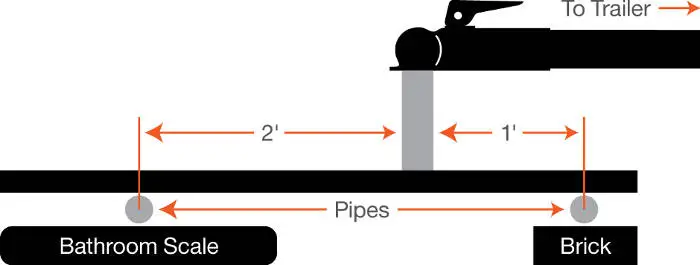
- Park on a level surface. To begin, make sure your trailer is parked on level ground and the wheels are chocked.
- Lay a 2x4 stud on the ground. Position a 2x4 or other sturdy board on the ground, directly below the trailer tongue. The board must be at least 3-1/2 feet long.
- Position a bathroom scale at one end and a block at the other. Place the bathroom scale roughly 2 feet from the trailer tongue, and a block or brick about 1 foot from the trailer tongue. Protect the bathroom scale with a small piece of plywood on top.
- Center the stud on two pipes. Insert two horizontal pipes -- one in the center of the bathroom scale and one in the center of the block. Measure the distance from the trailer tongue. Make sure the pipe on the scale is 2 feet from the center of the tongue, and the pipe on the block is 1 foot from the tongue.
- Rest the trailer tongue on a vertical pipe. Position a pipe vertically under the trailer tongue, and lower the trailer jack until the coupler is fully resting on the pipe.
- Read the scale and multiple by 3. Take an initial reading from the scale bathroom scale, and multiple it by 3. This is the tongue weight. (Bathroom scale reading) x 3 = (tongue weight)
C. Measuring with a Vehicle Scale
One last method for measuring the tongue weight of your trailer is to use a vehicle scale at a rest stop or at your local dump.
Begin by weighing your vehicle without the trailer hooked up. Then, hook up your trailer and weigh your vehicle again, without letting the wheels of the trailer touch the scale. Take the weight of your vehicle by itself and subtract it from the weight of your vehicle with the trailer attached. The difference is the tongue weight of the trailer.
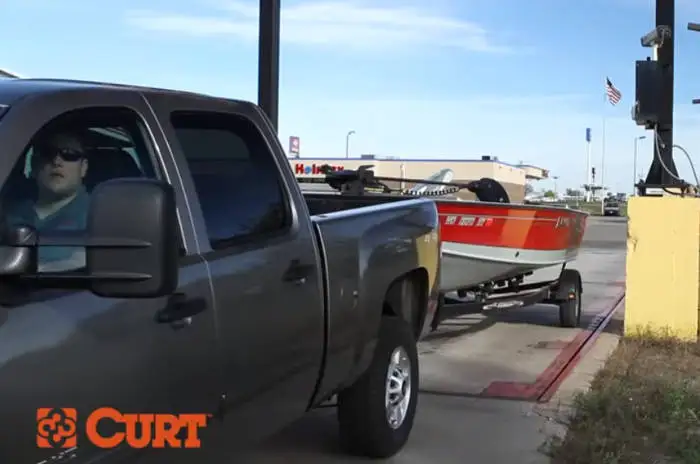
Couple Your Trailer Stress-free!
Hooking up your trailer can be stressful when you have to wrestle the coupler latch into place. So, QuickPin™ doesn't have a latch!
This revolutionary trailer coupler hooks up with a single pin for painless, stress-free coupling every time. No complicated hinging components and no headaches!
See how it works
Why is tongue weight important when towing?
Tongue weight is important for towing because improper tongue weight can cause driving hazards. If the tongue weight is too little -- less than 10% of the total trailer weight -- the trailer may tend to sway back and forth. If the tongue weight it too much -- greater than 15% -- your vehicle may become less responsive, especially when turning and braking.
Properly loading your trailer -- placing cargo in front of or behind the axle -- can have a major effect on tongue weight.
How do you measure tongue weight on a trailer?
To measure tongue weight on a trailer, you can use a tongue weight scale, a common bathroom scale or a vehicle scale. Place the tongue of the trailer on the scale, using the trailer jack or propping it up with a pipe.
What is tongue load?
Tongue load is the weight of a trailer at its tongue or coupling point. Typically, tongue load or tongue weight is 10 to 15 percent of the total weight of the trailer.
How do you weigh an RV tongue weight?
To weigh RV tongue weight, place the tongue of the trailer on a tongue weight scale. The TW can also be found by weighing your tow vehicle on a vehicle scale by itself and comparing it to the vehicle weight when the trailer is coupled.
RVs are typically heavy trailers, so the scale must be heavy-duty enough to handle the weight.
Can too much tongue weight cause trailer sway?
Too much tongue weight can cause trailer sway, but it primarily causes reduced control for the driver over the vehicle.
What should tongue weight be?
Tongue weight should be about 10% to 15% of the total weight of the trailer or gross trailer weight. Too much tongue weight can impair driver control over the vehicle, and too little can lead to sway in the trailer.
What happens if tongue weight is too heavy?
If tongue weight is too heavy, it can make your vehicle more difficult to control, especially when making turns and braking. If tongue weight is too light, it may cause the trailer to sway while driving.

Travel Trailer Towing Weight Calculator – Interactive!
The primary purpose of this calculator is to answer the question: “How heavy a travel trailer can I tow?”
This calculator is designed for travel trailers (also know as conventional trailers), towed by a ball hitch, either weight-carrying or weight-distributing.
In the form below, enter as many pieces of information as are required.
Our calculator updates in real-time! Play around with the sliders and watch how your cargo and tongue weight affect your maximum towing capacity.
If you are unfamiliar with the weights or abbreviations, you may want to start with Understanding RV Weights .
Want to see some examples? Jump below the calculator!
What About Our EZ Towing Calculator?
Are you looking for a quick n’ dirty answer to your towing questions??
We put a lot of work into the Trailer Towing Calculator (below), our 5th Wheel Towing Calculator, our Cargo & Truck Selector, and our other calculators.
But we get it … sometimes you just want a back-of-the-envelope solution.
Well, there’s no getting around the fact that accurate answers require accurate information.
But if you just need a towing gut-check, check out our new EZ Towing Calculator.
Even if you don’t own an RV (or tow vehicle), you can get all the information you need online. If you have the data from your tow vehicle door jamb stickers or trailer VIN sticker, even better. And you only need four inputs!
Some of the product links are on this page are affiliate links. If you click through and purchase, I may receive a small commission at no extra cost to you. See Privacy Policy. Thanks!
How This Towing Calculator Thinks
This calculator checks for four (4) main conditions:
- Is the loaded trailer weight greater than the maximum allowed by the Gross Combined Vehicle Weight Rating (GCWR)?
- Is the weight on the trailer axles greater than the total Gross Axle Weight Rating (GAWR)?
- Is the travel trailer tongue weight greater than the tow vehicle allowable hitch weight?
- Will the hitch weight plus payload exceed the tow vehicle’s payload capacity?
Other factors are checked as well, but the calculator bases most of its estimates on these four conditions.
All four conditions are mandatory and critical!
In algebraic terms, these equations are independent of each other. Just because a travel trailer’s weight doesn’t exceed the maximum towing capacity listed on the pickup truck brochure, for instance, doesn’t mean that the pickup truck might be overloaded by too many occupants!
Even if you don’t use this calculator, you can run through these same four questions on your own.
Most RV owners know to check A) the weight of the travel trailer and B) the loaded tongue weight. But what most commonly limits your towing capacity isn’t the weight of the travel trailer itself; it’s the payload capacity of the tow vehicle!
What this calculator does not (and cannot) address is another common problem: weight imbalances. Most RVs are unequally loaded side-to-side. Many motorhomes are unevenly loaded front to back, as well. It’s not uncommon to have one side of the RV weigh several hundred pounds heavier than the other side! This can easily cause tire blowouts from being overloaded, even though the total scale numbers look safe.
This calculator also assumes you are using a weight-distribution hitch when towing your RV, if you’re towing a travel trailer. Weight-distribution hitches are required by most pickup truck manufacturers once the trailer weight exceeds 5,000-6,000 lbs. Otherwise, you’ll overload the tow vehicle rear axle and unload the tow vehicle front axle. This creates a dangerous steering and braking situation, even if the axle isn’t overloaded.
For these reasons (and many more), we advocate caution and conservation when towing an RV. Use this i nteractive RV travel trailer towing calculator as a tool, not a substitute for your brain!
As of January 8, 2024, this interactive RV calculator is temporarily suspended. We apologize for the inconvenience, and we hope to have the calculator back up and running soon. In the meantime, we recommend reading through the rest of the notes on this page, which may help clarify your understanding. Thank you for visiting Changing Gears.
Helpful Links and Resources
Towing is a complicated subject! Here are some resources to help you along further.
- EZ Towing Weight Calculator: For a simpler (albeit less accurate) towing weight calculator.
- Driving an RV for the First Time. You’ll learn all about height, length, width, and weight restrictions!
- How to Select a Tow Vehicle. Our basic guide to choosing a tow vehicle when towing a camper or trailer!
- Tow Vehicle Towing Capacity Charts. Straight from the manufacturers.
- Tire Reference Info. Need load index tables, speed rating tables, inflation tables or tire FAQs? Start here!
- Towing and Trailering Advice from Ask The RV Engineer.
- RV Tire Safety Advice from Roger Marble.
Limitations of a Calculator
Any calculator has real-world limitations. A calculator cannot account for:
- Road conditions
- Inclement weather
- Sleep deprivation
- Length of your vehicle wheelbase
- Mechanical degradation
- Inflation pressure of your tires
- Behavior of other drivers
- Your personal risk tolerance
- Weight imbalances
Towing an RV is safe – until it’s not. It is your responsibility for learning the in’s and out’s of towing and the limitations of YOU, YOUR VEHICLE and YOUR TRIP. Be safe out there!
This calculator makes certain assumptions about Front Axle Load Restoration (FALR)%, hitch design, and other factors that are not necessarily accurate! Therefore, the calculator may under- or over-estimate your actual towing capability. That is why weighing your RV is so critically important.
Need a Better Towing Hitch?
So … you’ve probably realized by now that you need a weight-distribution hitch.
A simple ball hitch simply puts too much weight on the rear axle of your tow vehicle. A weight-distributing hitch helps equalize that weight across the front axle of your tow vehicle and the axle[s] of your trailer.
In fact, most truck manufacturers require weight-distribution hitches to achieve maximum towing capacity, especially if you’re towing over 5,000/6,000 lbs.
We like the Andersen No-Sway, No-Bounce Weight Distribution hitch.
Need a Weight-Distribution Hitch?
Calculator example (with numbers).
In this scenario, you know quite a bit about the truck. Also, since buying the vehicle, you have installed a heavy toolbox in the bed, increasing the truck weight by almost 1,000 lbs.
Because of this, the calculator found the GVW to be the most restrictive number and reduced the maximum trailer weight accordingly. Let’s see how.
Example: Using a hypothetical truck similar to the 2005 Dodge RAM 1500, regular cab, 4×4, 5.7L HEMI Magnum V8 engine:
- Tow vehicle GVWR: 6,350 lbs
- Tow vehicle GCWR: 14,000 lbs
- Tow vehicle TC (Advertised): 8,900 lbs
- Tow vehicle RGAWR: 3,900 lbs
- Tow Vehicle HWR: 1,000 lbs
- Tow vehicle GVW: 4,845 lbs
- Tow Vehicle Cargo: 1000 lbs
- Tow Vehicle Passengers: 1 (Driver)
Calculated Maximum Trailer Weight: 3,550 lbs
As you can see, the calculated result of 3,550 lbs is significantly lower than the maximum specified by Dodge at 8,900 lbs!
In fact, the calculator even tells you that the GVWR is to blame. In other words, you’re maxing out your tow vehicle’s maximum allowable weight before anything else!
The large difference is because the manufacturer ratings use the truck weight with standard equipment and driver only. Options and cargo add to the truck weight, reducing towing capacity.
What’s the difference between TVTV, GVW, UVW and curb weight?
These numbers all measure the weight of a sitting truck at different conditions.
- Curb weight is the weight of a tow vehicle with all optional equipment included and all operating fluids (oil, gasoline, transmission fluid, brake fluid, etc). Dry weight is simply curb weight minus the weight of the operating fluids. Curb weight is sometimes called empty weight.
- GVW and TVTW are very similar! GVW stands for Gross Vehicle Weight. It measures the weight of a tow vehicle simply as it sits, without any other conditions. Tow Vehicle Towing Weight is the GVW of a tow vehicle as outfitted for towing, for instance, with a receiver, ball mount and tow ball installed. In accordance with SAE J2807, we use the term TVTW.
Neither of these two measurements include the driver, passengers, or any cargo payload.
It is critical that you weigh your tow vehicle in its TVTW state. You should not rely on factory curb weights! There only way to know your TVTW weight is to weigh your vehicle with a vehicle scale. In all likelihood, there is a vehicle scale near your area, as they are required for the transportation industry.
When you weigh your vehicle, you can also weigh the FGAW (Front Gross Axle Weight) and RGAW (Rear Gross Axle Weight). This is especially important if you’ve installed aftermarket equipment such as a toolbox.
Knowing your RGAW is critical for measuring maximum payload and hitch weight capacity. In fact, you should also weigh your setup with your trailer coupled. That way, you can confirm that the RGAWR of your tow vehicle is not exceeded.
Unpermitted Scenarios
Our calculator does not permit the below scenarios. This is why all input information is required for accurate results.
What I only know the truck’s GVW and GCWR?
A common “mistake” – albeit one made intentionally by RV salesman and truck manufacturers – is to calculate maximum towing capacity simply by subtracting the weight of the truck from the combined vehicle weight rating.
This is a best-case scenario!
- This assumes a stripped-down tow vehicle with no mods or optional equipment, a 150-lb driver (thanks for rubbing it in, guys!) and no onboard cargo.
- This also assumes that perfect mechanical reliability and performance (yeah, right!).
- It even assumes that the trailer brakes do 100% of the RV braking work, which isn’t the case for older or unadjusted brakes.
A similar mistake, although more conservative, is to subtract the truck GVWR from the GCWR. This assumes that the truck is fully loaded, and therefore reduces the towing capacity by 1:1.
On the face of it, this looks more conservative. However, it’s NOT. A fully loaded truck – that is, when the passengers and cargo equals the payload capacity – can’t tow anything. Not a pound. Because any additional weight would overwhelm the tow vehicle GVWR!
What if I only know the hitch maximum tongue weight rating?
Another common error is to assume that the hitch weight rating of the truck is the limiting factor and to base the maximum trailer weight solely on it.
For instance:
- Maximum hitch weight = 500 lbs
- Assumed tongue weight percentage = 15%
Maximum trailer weight = 3,333 lb!
In fact, in this scenario, the above calculation has put us well over the 1,700/2,900 lbs (manual/auto transmission) specified as the maximum trailer weight by Chevrolet for this sample vehicle.
Nor does this back-of-the-envelope calculation factor in the effect of payload. While the 15% tongue weight percentage is more conservative than the 10% standard, this still isn’t an accurate assumption.
For instance, if you’ve loaded so much cargo into the truck bed that you have only 200 pounds of payload remaining, your maximum trailer weight would be just 1,333 lbs at a 15% tongue weight!
Speaking of tongue weights, no, a weight-distribution hitch does not allow you to tow more than the factory or recommended weight! It redistributes a portion of the tongue weight to the tow vehicle front axle and the trailer axles, reducing the amount seen by the tow vehicle rear axle. The exact redistribution ratio varies by tow vehicle geometry, trailer geometry, and hitch calibration and setup.
These scenarios illustrate that relying on too little information may cause you to exceed manufacturer ratings . On the other hand, providing the calculator with all relevant weight numbers will produce accurate results
What About the 80% Margin Rule?
The most common gut-check for towing a trailer is to assume your practical towing capacity is 80 percent of the advertised capacity.
Is this right? Wrong? Conservative or dangerous?
It’s none of those things.
The 80% rule is based on a lot of assumptions: that you’re carrying extra payload, but not too much; that the trailer tongue weight is over 10%, but not too much; that you’re ferrying passengers, but not too many …
The 80% towing rule is a good starting point. But it may be wildly inaccurate for your situation.
You may be arbitrarily limiting what you can tow!
- Or you may be over-estimating your capacities. If you’re ferrying five adult passengers with a full pickup bed, your F-150 may not be able to tow anything at all!
- That’s true for any other version of the 80% rule, like the 75% rule, 70% rule, 80% of GCVWR, etc. All of them are starting points only.
Many times, it is true that your calculated maximum towing capacity will be 60-80% of your advertised towing capacity. But you need to confirm this estimate with an actual calculation!
We may recommend products or services that our Readers will find helpful. Affiliate commissions are at no extra cost to you. And they don’t influence what we think! Thanks for supporting this website! For more information, please read our Privacy Policy and Terms of Use.
Get our best delivered!
First Name*
Email Address*

8 Essential Tips for Nomads Camping at a High Elevation
Harvest hosts review: loved it, but didn’t renew it, we loved our rv, but hated the interior, how i fixed my class a’s handling with supersteer safe-t-plus, our first rv walkthrough and the surprises we found, 7 questions to ask your warranty policy provider before you hire an rv repair technician, ready to rent an rv.
- Calculators
- Manufacturers Lists
- Affiliate Partners
- Clubs & Memberships
As an Amazon Associate, this site earns from qualifying purchases. We may recommend products or services that our Readers will find helpful and convenient. Affiliate commissions are at no extra cost to you. Thanks for supporting this website!

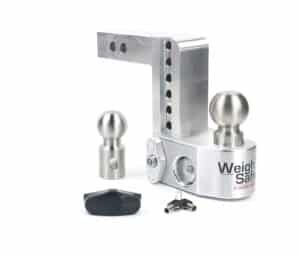
WEIGH SAFE ADJUSTABLE BALL MOUNT
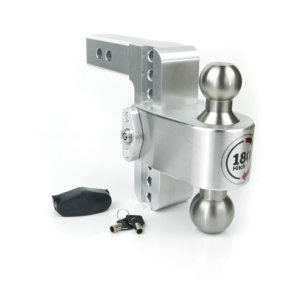
TRUE TOW WEIGHT DISTRIBUTION
Heavyweight, middleweight.
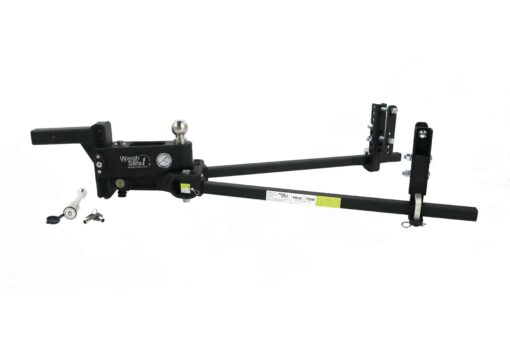
HEAVYWEIGHT - ORIGINAL
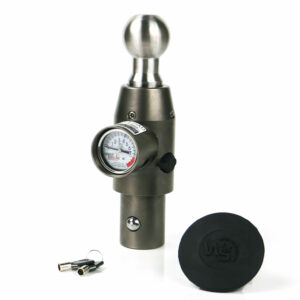
WEIGH SAFE HITCH PIN LOCK
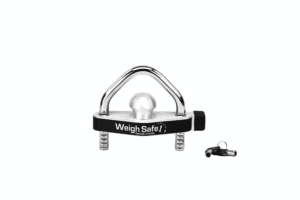
WEIGH SAFE CLAMSHELL CONVERTER
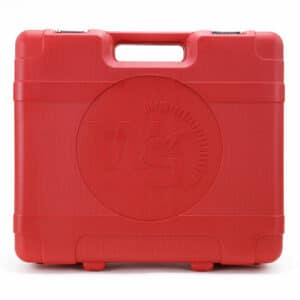
WEIGH SAFE STORAGE CASE
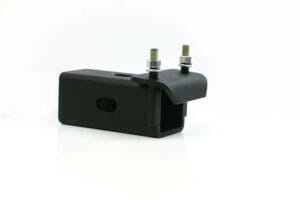
WEIGH SAFE ANTI-RATTLE REDUCER
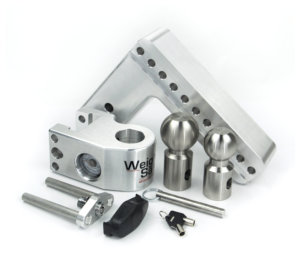
WEIGH SAFE ACCESSORIES & PARTS
- About Weigh Safe
- Brand Ambassador
- Social Media
- Frequently Asked Questions
- Return Policy
- Weigh Safe App
- Dealer Locator
- Authorized MAP Policy
- Become A Dealer
- Dealer Content
- Dealer Portal
- New Dealer Registration
- Unauthorized Dealers
- Search for:
No products in the cart.
Return to shop
Tongue Weight Calculator
How tongue weight affects your vehicle.

Don’t be this guy with too much tongue weight

Or this guy with too little tongue weight

Because you might end up with your life at risk like this guy
Towing Peace of Mind ™
Find out how weigh safe can help you perfectly balance your vehicle’s towing load and improve trailer performance.
Find Your Tongue Weight
Tongue weight range, (safe tongue weight should be in this zone).
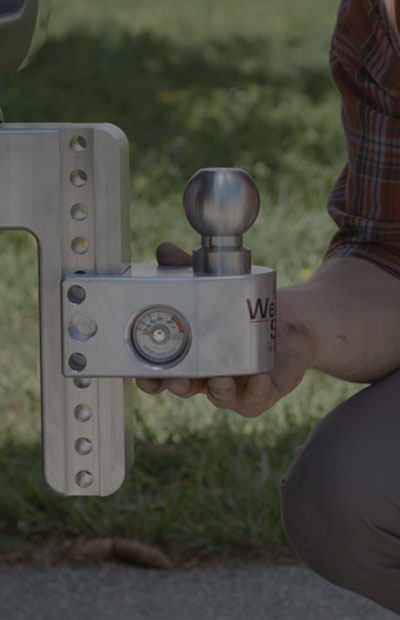
WEIGH SAFE 180 BALL MOUNT
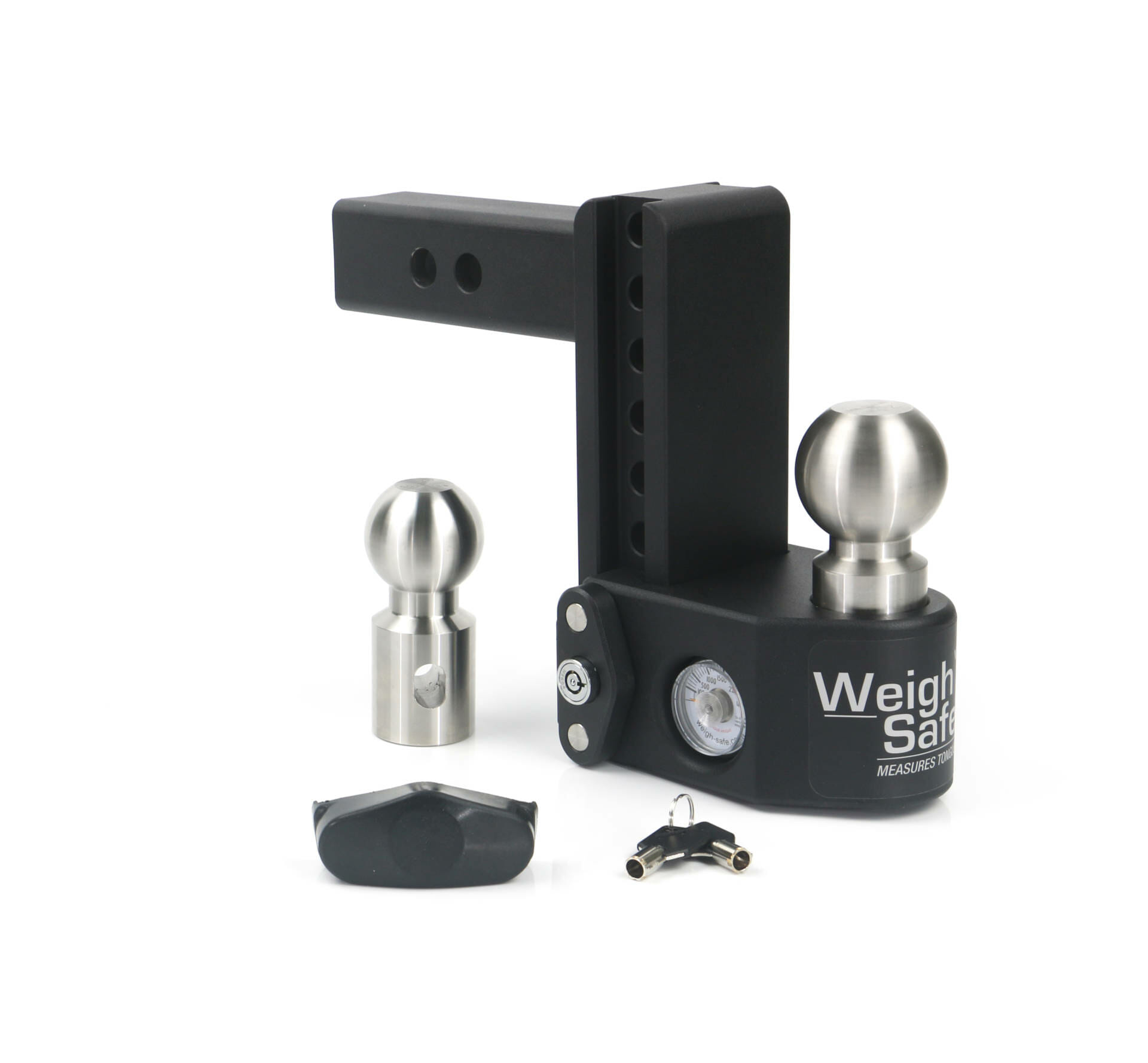
STEEL WEIGH SAFE ADJUSTABLE BALL MOUNT
Steel weigh safe 180 pro ball mount, weigh safe aero hitch, cerakote black weigh safe adjustable hitch, cerakote black weigh safe 180 ball mount, weigh safe fixed height ball mount.
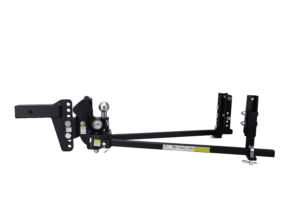
TRUE TOW HEAVYWEIGHT WEIGHT DISTRIBUTION - ORIGINAL
True tow middleweight weight distribution, weigh safe oem gooseneck, weigh safe b&w gooseneck, weigh safe in-bed rail gooseneck, weigh safe vehicle recovery hook, weigh safe soft shackle ring, weigh safe hard shackle, weigh safe cerakote recovery hook, weigh safe cerakote soft shackle, weigh safe ball coupler lock, weigh safe trailer coupler latch lock, weigh safe padlock, weigh safe 3pc lock set, weigh safe extra keys, weigh safe all locks & keys.
- WARRANTY/RETURNS
- ABOUT WEIGH SAFE
- NEW DEALER REGISTRATION
- DEALER RESOURCES
- DEALER LOCATOR
- BRAND AMBASSADORS
- SOCIAL MEDIA
Privacy Overview
Username or email address *
Password *
Remember me Log in
Lost your password?
Email address *
A link to set a new password will be sent to your email address.
First name *
Last name *
Phone *
I have read and agree to the website terms and conditions *
Your personal data will be used to support your experience throughout this website, to manage access to your account, and for other purposes described in our privacy policy .
- Skip to main content
- Skip to secondary menu
- Skip to primary sidebar
- Skip to footer

Jeffsetter Travel
Travel Consultants and Travel Tips
How To Weigh Your Travel Trailer At Home
January 20, 2021 by Charlotte Phillips
Last updated on June 23rd, 2023 at 09:09 am
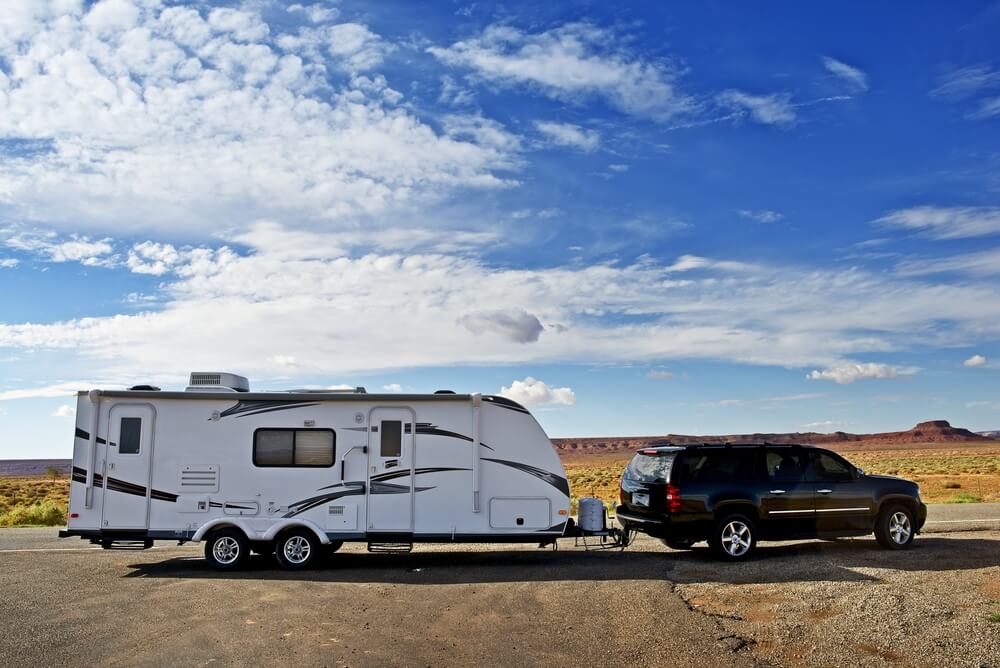
All of our reviews are based on exhaustive research, industry experience, and whenever possible, hands-on testing. When you make a purchase using one of our chosen links we’ll receive a small percentage of the proceeds. This supports the site and keeps Jeffsetter running. You can read more here .
You just bought a new rig and are confident about your vehicle’s ability to tow it. Hopefully, you already know your travel trailer’s dry weight from the manufacturer, but this gets you thinking: what does my trailer weigh after I’ve filled it up with personal belongings and supplies?
Whether you’re brand new to towing or have owned many travel trailers in your life, knowing the weight of your trailer at various stages of use is important, both for purchasing a hitch and for the life of your vehicle.
The last thing you want to do is purchase a travel trailer your vehicle can’t handle! But how can you possibly determine the weight of it, especially if you have no RV dealer nearby? It’s important to weigh your trailer before a long trip, but can this be done from the comfort of your own driveway?
You can use the bathroom scale technique, and while an average bathroom scale can’t measure the entire weight of your trailer tongue you can take your initial reading and multiply it by three. You can also use tongue weight scales that are designed to measure tongue weight, or a device called BetterWeigh mobile towing scale.
As you can see, you can weigh your travel trailer at home using a variety of options ! Let’s take a look at some of these as well as why knowing your trailer weight is essential when owning an RV.
Understanding Your Trailer’s Various Weights
If you’re new to the RV world , you may be feeling a bit confused about trailer weight. Going to an RV dealership without knowing how much your vehicle can tow can spell disaster if you end up bringing a travel trailer home. If it’s too heavy for your vehicle, you may cause irreparable harm!
Thankfully these weights and numbers are fairly easy to understand, and manufacturers always include a starting weight of any travel trailer they make, so you won’t be entirely in the dark about how much your trailer weighs.
Here are some of the terms you should know when it comes to weighing your RV, and what it means for you when it comes to weighing at home!
Gross Vehicle Weight Rating (GVWR)
This is the maximum allowable weight of a fully-loaded trailer, including liquids, passengers, cargo, and the tongue weight of any towed vehicle (most travel trailers can’t tow an additional vehicle). This is the weight you will want to know before departing on your first camping trip with your new travel trailer ! It is the most a trailer can weigh in total, as determined by the trailer manufacturer.
Gross Combined Weight Rating (GCWR)
GCWR is the maximum weight of your vehicle with a trailer attached, as determined by the vehicle manufacturer. This means the weight of both the tow vehicle and the trailer together. It also includes any cargo or load placed in either vehicle.
Dry Weight or Unloaded Vehicle Weight (UVW)
UVW means the weight of an RV as built at the factory, by the manufacturer. It does not include the weight of the cargo, freshwater, propane gas, occupants, etc. It is the weight of the trailer with nothing extra in it, and is the weight you should know when shopping for a new travel trailer!
Tongue Weight or Hitch Weight (HW)
Also known as tongue weight, HW is the amount of weight of the trailer that is carried on the hitch. You will need to know this weight when shopping for a proper hitch. Hitches are rated both by their towing capacity and their tongue weight, but we will touch more on this later.
Gross Axle Weight Rating (GAWR)
GAWR is the maximum allowable weight each axle assembly is designed to carry. This is important to know because it’s possible to be under the GVWR and still exceed an axle rating, depending on how you load the RV with your personal cargo.
This is a lot of information to digest, but once you get more familiar with travel trailers and what it all means, the various weights of your trailer will make a lot more sense! You will come to understand why it is necessary to know these weights and the importance of staying within certain ranges depending on your tow vehicle.
Why Does Travel Trailer Weight Matter?
When it comes to towing a travel trailer, why might the weight of your rig matter? Besides what has already been discussed, such as wear and tear on your tow vehicle, there are other important factors when it comes to the weight of your travel trailer.
Improved Longevity
Keeping the weight of your travel trailer down near the lower end of your tow vehicle’s towing capacity will ensure a long life for it, especially if you’re planning to tow over many mountain passes or other strenuous drives. It’s important not to overload your car or truck, and keep the ambient temperature outside in mind when towing, as too hot temperatures can overheat your engine.
Function Of Axles, Frame, And Suspension
The weight inside your trailer matters for the overall health of your axles, frame, and suspension. If you fill your travel trailer with heavy objects, even if your tow vehicle can handle it, it might not be the best idea for the life of your trailer, and it may not be level either .
Toy haulers are a good type of travel trailer to look at if you plan on hauling a lot of heavy equipment or additional recreational vehicles. They are built to handle such weight, but even toy haulers have their limits. It’s important not to overload your trailer’s frame, as it can bend and warp from continued improper weighting.
Improper weighting inside your rig matters when you tow as well, and each axle has its own preferred amount of weight per axle. So arranging items inside your trailer matters too! If you leave too many things toward the front of your trailer, you may find it more difficult to tow, as well as putting too much weight on one axle instead of both axles.
Safer Towing
The most important thing to consider when it comes to weight and your RV is when it’s time to tow. The weight of your travel trailer affects what level of hitch you buy as well as how difficult your rig might be to control on the road. A heavier trailer may prove trickier to control on large freeways and other roads, so keep this in mind before you set off on your next adventure!
How Much Do Things Weigh, Anyway?
It’s time to hit the road, but you’re worried about what your rig will weigh once you fill it up with supplies- and rightly so! When you think about an empty trailer versus a full one, the weight can shift drastically; most RVers budget at least 1,000 pounds going into their trailer, depending on the size of it!
There’s no exact measurement for every little thing you’re putting into your trailer unless you choose to track it yourself. This can sound exhausting, and the hope is that you’re not putting in too many things so that you’ll never be close to your maximum weight. However, here are some helpful numbers and items to keep in mind should you need to know the weight of what you’re putting into your RV!
- Water : 8.3 pounds per gallon
- Propane : 6 pounds per gallon
- Food : Listed on the boxes and cans, more often than not. A quick tally should work well for you, but always budget 5-10% more weight, just in case.
- Clothes : This is the toughest one to judge, and you can find out specifically from your clothing manufacturer’s websites or clothing listings, but this may be too tedious. However, an average suitcase’s worth of clothes can weigh 50 pounds, so keep this in mind when calculating your clothes
Don’t forget your kitchen appliances and dishes, any tools or toys, and always budget 5-10% more weight than your final calculations. Hopefully, you won’t ever have a problem with too much stuff!
The time has come to weigh your new travel trailer, but you’re not ready to hitch up and tow it to a professional weigh station. The good news is, you can weigh your travel trailer at home! I know what you’re thinking: do I have to buy yet another RV accessory? My answer for you is: it may save you an awful lot of headaches if you choose to.
But the good news is you can weigh your travel trailer with a bathroom scale should you be out of any other options! This is only recommended for smaller travel trailers , but it will work in a pinch if you’re willing to set it up correctly. Let’s go over the different ways of weighing your RV at home.
Bathroom Scale Technique
Your very own bathroom scale can be used to weigh your travel trailer. Can you believe it!? It may surprise you, but it’s possible with some setup involved. Most RVers use a bathroom scale to measure the tongue of their trailer only, which makes up about 10-15% of your travel trailer’s weight. This is a necessary number when it comes to determining your hitch as well.
Here’s a step-by-step guide to weighing your trailer’s tongue.
1. Ensure The Trailer Is Level
Being level is important when getting an accurate weight. Also, chock your wheels during this process for your own safety.
2. Lay A 2×4 Beneath The Trailer Tongue
Position a reliable board on the ground, directly below the trailer tongue. The board must be at least 3-1/2 feet long for this trick to work.
3. Place The Bathroom Scale At One End And A Brick At The Other
Place the bathroom scale roughly 2 feet in either direction from the trailer tongue, and a block or brick about 1 foot from the trailer tongue in the opposite direction of the scale. You’ll want to protect the bathroom scale with a small piece of plywood or other material on the top.
4. Center The Wood, Scale, And Brick On Two Pipes
Insert two horizontal pipes between the 2×4 and scale/brick: one in the center of the bathroom scale and one in the center of the brick.
5. Rest The Trailer Tongue Against A Vertical Pipe
Lower the trailer jack until the coupler is fully resting on a vertically-positioned pipe.
6. Read The Scale And Multiple By 3
An average bathroom scale can’t measure the entire weight of your trailer tongue. That’s why you take your initial reading and multiply it by three! This should be your trailer’s tongue weight.
Tongue Weight Scale Technique
One of the other popular methods for weighing a travel trailer at home is by using a tongue weight scale. Unlike bathroom scales, tongue weight scales are designed to measure tongue weight, so they are a bit more robust and durable and can be bought from towing stores.
It’s possible to buy ball mounts that have a scale already built-in for ultimate convenience, though don’t panic if you don’t have one of these as they aren’t really necessary. Using tongue weight scales is pretty straightforward. You simply need to raise the tongue and support it with blocks underneath the scale at the towing height. The coupler can slowly be lowered down onto the tongue weight scale and a reading should be shown.
Just be sure your trailer is stabilized correctly before going ahead and using a tongue weight scale. And remember you’ll need to purchase a scale able to handle your rig as tongue weight scales have different capabilities.
Use BetterWeigh Mobile Towing
While it’s another accessory to buy, most RVers enjoy using a little device called the BetterWeigh Mobile Towing Scale by CURT (which you can see on Amazon). This device can measure the weight of your trailer and tow vehicle as well as specific parts of your trailer, such as the gross weight, cargo, payload, tongue weight, pin weight, and weight distribution. Plus it is controlled via your smartphone so you can weigh whatever you’d like on the go with little to no hassle!
It is an incredibly easy device to use as well as install. It simply plugs into your vehicle’s diagnostic port under the steering wheel and uses Bluetooth to send the information to your phone. Sounds like magic, right? It is in a way but requires a bit of math to calculate your trailer’s weight.
From a level surface, accelerate your unhitched vehicle to about 25mph. This handy device receives data about torque and translates that into vehicle weight. Once you have the tow vehicle weight, hook up your trailer and once again accelerate to 25mph. The device will report your combined gross vehicle weight. Subtract the weight of your truck from the combined weight and you have your trailer weight all on its own! This is demonstrated clearly in the video below:
While it’s yet another object to buy, it is the simplest and most advanced way of weighing your trailer at home. Again, always budget extra weight, even using this device, as it cannot give you as accurate a reading as, say, a weigh station can. But it will do it easily, especially since you can do it from the comfort of your own home! It’s still budget-friendly (particularly when compared to other RV accessories) and you can check out the latest price on Amazon by clicking here .
How Can I Keep Travel Trailer Weight Distributed Evenly?
So, maybe you’ve weighed your travel trailer at home and have realized you’ve been carrying a bit more weight than you should have been! To avoid any regrets in the future , it’s best to empty out your trailer and work out the things you need, and the belongings able to be left behind to keep weight down.
A key to safely towing a travel trailer is to distribute weight evenly across the RV. This means not loading all of your heaviest items in one area, or loading the back or front of the trailer with super heavy items. A travel trailer with an uneven load can be dangerous on the road, especially in windy conditions where you’ll have to slow down a substantial amount to avoid the trailer swaying.
Keeping the weight in your travel trailer distributed evenly is quite simple. Placing heavier items close to the front of the trailer is a good idea, whilst lighter items can find a home towards the rear of the rig. Also be sure to keep the weight evenly from side to side, as ideally, you don’t want one side of the trailer to be lower than the other!
Where Else Can I Weigh My Travel Trailer?
If you aren’t ready to weigh your trailer at home, it can be done elsewhere for a fee. Fill up your trailer as if you were camping, then head to the professionals! Some places you can weigh your trailer are:
- CAT scales and other weigh stations
- Truck stops
- Locations listed on some RVer websites
Always keep an eye on whether or not a scale is certified at a weigh station, as this will ensure an accurate reading. You may also need to keep in mind what states you are thinking about traveling through , as the rules for travel trailer weighing vary from state to state.
If you’re not ready to weigh your travel trailer at home, professional CAT scales are the way to go and are often not terribly expensive. Plus, they get cheaper the more often you weigh, so never hesitate to weigh your travel trailer before you hit the road!
Conclusion
Weight matters when it comes to your new travel trailer, and having an accurate number can make or break your next camping trip. Fill up your trailer, use your BetterWeigh device, or head for a CAT scale near you. There’s nothing better than the peace of mind that comes from knowing how much your new rig weighs!
Important Links
- Advertising Policy and Affiliate Disclaimer
- Privacy Policy
- Contact Jeffsetter Travel Blog
- Ask Jeffsetter a Question
Recent Posts
- Win HawaiianMiles and a Turtle Bay Stay!
- Review: Alamo Kahului Mercedes-Benz GLC 300
- Activate: Chase Freedom Q3 2024 Bonus Categories
- Chase Sapphire Lounge is Coming to LAX
- Review: Southwest 3524 Honolulu to Kahului

Tongue Weight Calculator
Don’t risk an unstable and dangerous tow. Our Tongue Weight Calculator provides quick and easy calculations to ensure you have the perfect balance between your tow vehicle and the loaded trailer.
Minimum Tongue weight: lbs
Maximum Tongue weight: lbs
Using steps:
- Enter the maximum weight capacity of the tow vehicle’s hitch in pounds.
- Enter the total weight of the loaded trailer and its contents in pounds.
- Click on the “Calculate” button.
- The calculator will display the minimum and maximum tongue weight in pounds.
By following these simple steps, you can easily determine the tongue weight for your towing setup, ensuring a safe and stable towing experience.
Note : It is important to consult the manufacturer’s guidelines for your specific towing setup to ensure that you are within the recommended weight limits and towing specifications.
Benefits of Using Our Tongue Weight Calculator
Accurate results:.
Our tongue weight calculator provides you with accurate results that are based on the actual weight of your trailer and load.
This means you’ll receive more exact and precise measurements that are essential for safe towing and legal compliance.
Easy to Use:
The calculator is simple and intuitive to use. All you need to do is enter the weight of your trailer and the distance from the hitch.
The calculator will then quickly and easily give you the recommended tongue weight for your load.
Time-saving:
Our calculator can save you time and hassle when trying to determine your tongue weight distribution.
Instead of having to manually calculate the weight distribution, our online calculator will do it for you in just a few seconds.
Safe Towing:
The primary benefit of using a tongue weight calculator is its ability to ensure safe towing.
By correctly distributing the weight between the trailer’s hitch and axle, you can avoid swaying or tipping while on the road.
Improved Towing Performance:
Properly calculating your tongue weight can also increase your towing vehicle’s performance.
The right distribution of weight over the travel trailer’s capacity will result in a smoother and more efficient ride.
Legal Compliance:
By accurately calculating your tongue weight, you can make sure your trailer is compliant to local laws that regulate the maximum towing capacity of your vehicle. This is essential for avoiding fines or even impoundment.
Avoid Overloading:
The tongue weight calculator helps you make sure that your trailer doesn’t become overloaded.
This helps you avoid potentially dangerous situations while towing a travel trailer.
Cost-effective:
The tongue weight calculator is also cost-effective as it helps you maximize the efficiency of your towing vehicle.
With the right weight distribution, you can save on both fuel and maintenance costs.
Common Methods for Measuring Tongue Weight
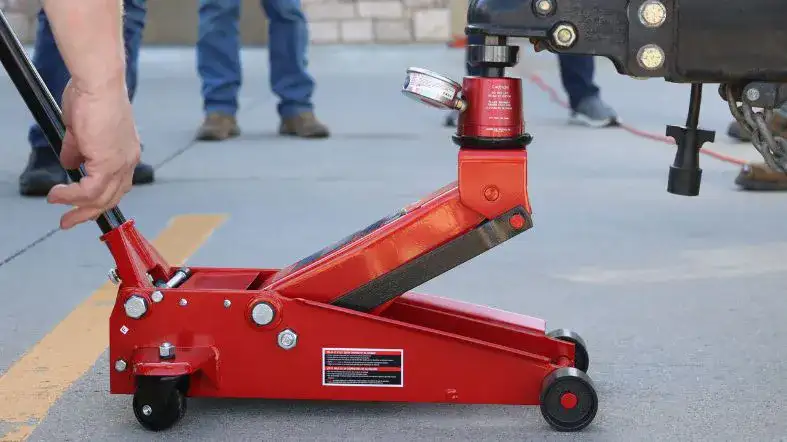
1. Metal Scale:
A metal scale is a traditional, simple and relatively inexpensive tool for measuring tongue weight.
This device is usually made of steel and placed beneath the tongue of a travel trailer. The weight of the tongue is determined by the weight sensed on the scale.
This is an easy method, but accuracy may be an issue if the scale isn’t properly calibrated.
2. Tongue Weight Gauge:
This is a more advanced and accurate tool for measuring the tongue weight of a trailer.
It is basically a gauge, often digital, that is placed under the tongue of the trailer and measures the weight through pressure.
It is much more accurate than the metal scale and is highly recommended for trailers or campers that require precise measurements for safety reasons.
3. Tongue Scale:
A tongue weight scale is commonly available at trailer towing supply shops, and it’s a small scale particularly designed for measuring the tongue weight of the trailer.
It’s extremely straightforward to calculate the weight of the tongue using the tongue weight scale.
It involves only two steps, including placing the scale under the trailer jack and taking the reading.
If the jack doesn’t fit properly, you can place a sturdy pipe vertically between the scale and the coupler.
For better convenience, you can buy a model like the CURT BetterWeigh towing scale.
You can sync this device with your smartphone and get real-time towing weights as well as gross combined weight and weight distribution.
4. Weighing Platform:
Weighing platforms are devices that allow you to weigh the tongue of your trailer.
They are accurate and easy to use, requiring only that you place the platform on a level surface.
It will measure the tongue weight and also provide a reading of the trailer’s total weight.
This is a great tool for those who need to measure tongue vehicle weight often.
5 Calculating with a Bathroom Scale
You can also measure the tongue using a normal bathroom scale instead of a tongue weight scale.
However, the bathroom scale has limitations, like it might not measure over 300 pounds.
In addition, you have to put plywood on it before placing the tongue to protect the scale’s finish.
If you expect the tongue weight to be less than 300 pounds, put it on the scale.
If the tongue vehicle weight is likely to be more than 300 pounds, you can set up a test using some pipes and boards. Below is the step-by-step process:
- Park your trailer on level ground and chock the wheels.
- Place a 2×4 or a sturdy board below the trailer tongue on the ground. Make sure the board is a minimum of 3-1/2 feet long.
- Place your bathroom scale around two feet away from the trailer tongue and position a block roughly 1 foot away from the trailer tongue. As mentioned, place plywood on top of the bathroom scale to protect its finish.
- Put one horizontal pipe in the middle of the bathroom scale and the other in the middle of the block. Then note the distance from the tongue. Keep the pipe two feet away from the middle of the trailer tongue and one foot away from the block.
- Place a pipe vertically underneath the tongue and keep lowering the jack until the coupler rests on the pipe completely.
- Finally, note the bathroom scale and multiply the number by 3, which will be your desired tongue weight.
Calculating with a Vehicle Scale
Another alternative method to calculate tongue weight is by using a vehicle scale at the local dump. The process is:
- Weight the vehicle without the trailer hooked up.
- Weight the vehicle once again, hooking up the trailer. Make sure the trailer wheel doesn’t touch the scale.
- Then deduct the reading without the trailer from the reading with the trailer and the difference is your required tongue weight.
Proper Tongue Weight
Maintaining proper tongue weight is crucial. Too little torque weight can cause the vehicle to sway from side to side and makes it difficult to keep control behind the wheel.
Conversely, excessive vehicle tongue weight can weigh down the rear wheels of the vehicle and make steering fairly difficult.
Typically, the tongue weight should be around 10% to 15% of the loaded trailer’s total weight. It is also known as GTW (gross trailer weight).
It means if you are hauling a trailer with around 2000 pounds of cargo, the tongue weight should be around 400 to 600 pounds.
Why Tongue Weight Calculator Is Important
1. helps ensure proper balance and stability.
Utilizing a tongue weight calculator helps maintain balance between the trailer and the towing vehicle, ensuring that the tongue weight is properly distributed and the vehicle is not overloaded.
2. Encourages safe and comfortable trailering
Tongue weight is a major factor to consider when determining safe towing capacity. A calculator helps you determine the ideal tongue weight for your trailer and towing vehicle combination.
3. Prevents vehicle overload
Ensuring that the tongue weight is correctly proportioned will prevent overloading the vehicle, which can cause instability or create a dangerous situation.
4. Helps you determine the ideal towing vehicle
Using a tongue calculator is a valuable tool to use when selecting a towing vehicle. It can help you make sure the vehicle you choose is suitable for your application and make sure you don’t overload it.
5. Reduces the risk of accidents and damage
An overloaded vehicle is more likely to be involved in an accident, which could result in costly damage to the trailer or vehicle, or even injury to the driver or occupants.
The vehicle tongue weight calculator helps ensure that the trailer and vehicle are appropriately matched and safely loaded.

6. Improves trailer handling
Finding the right tongue weight for your trailer and vehicle combination will help maintain an even distribution of weight over the towing hitch, improving overall handling and braking.
7. Maximizes fuel efficiency
When everything is properly balanced and evenly distributed, the vehicle is able to use its power more efficiently, reducing fuel consumption and maximizing fuel efficiency.
8. Maintains proper torque
Proper vehicle tongue weight helps ensure proper torque between the trailer and the towing vehicle, avoiding undue stress on the suspension and axle that could damage the trailer or vehicle.
9. Promotes a longer lifespan
Overloading your vehicle or trailer can damage critical components and reduce the lifespan of your equipment.
Using a tongue calculator helps ensure that these components aren’t placed under excess strain and maximize their service life.
10. Promotes smooth, safe trips
The right combination of tongue weight and trailer weight distribution makes for a smoother and more comfortable towing experience, and a safer trip overall.
How To Maintain Proper Tongue Weight
In general, every towing vehicle comes with information about the safe towing weight.
A vehicle owner shouldn’t tow more than the recommended handle that it can’t handle.
If you load over or under the gross trailer tongue weight, you should adjust the load before starting the vehicle.
If the tongue weight is too low, move some cargo near the front of the trailer to add more tongue weight.
Conversely, if the weight is too much, move the cargo away from the tongue. You may also need to remove cargo to avoid damaging the tow vehicle.
While adjusting the cargo from front to back, try to maintain the balance on the right and left sides.
Why Is Maintaining Proper Tongue Weight Vital for Towing?
Calculating and maintaining proper tong weight is crucial to avoid causing a driving hazard to the driver himself as well as others on the road.
Incorrect tongue weight can easily cause trailer sway, which makes it difficult to regain control, making it extremely dangerous.
Other potential consequences of incorrect tongue weight include:
- Tire blowouts.
- Brakes that become unresponsive.
- Traffic accidents.
- Serious damage to the trailer or vehicle.
- Rear tire overload.
- Personal injury or even death.
Is The Tongue Weight And The Hitch Weight The Same?
No, the tongue weight and the hitch weight are not the same.
Tongue weight is the weight that the trailer places on the hitch of the tow vehicle, while the hitch weight is the weight of the trailer that is transferred to the hitch and onto the tow vehicle’s axles.
The tongue weight should be a portion of the total weight of the trailer and its contents and is an important factor in determining the safe towing capacity of a vehicle.
The hitch weight, on the other hand, is the weight that is actually transferred to the hitch and onto the tow vehicle’s axles and is used to determine the stability of the towing combination.
Is The Higher Or Lower Trailer Tongue Better?
Neither a higher nor a lower trailer tongue is better. Maintaining a balanced tongue weight is always best. But if you can’t maintain the balance, go slightly lower.
Can Too Much Tongue Weight Cause Sway?
Yes, too much tongue weight can cause swaying from side to side and make it challenging to control. Even the extra force can overload the rear tires of the vehicle and push the back end of the towing vehicle around.
Final thoughts
The Tongue Weight Calculator is a great tool for helping people accurately and quickly calculate their tow vehicle’s load capacity.
It’s simple to use and provides immediate results, making it a great resource for anyone who needs help figuring out the right amount of weight their vehicle can safely handle.
Overall, the Tongue Weight Calculator is an invaluable tool for anyone looking to safely and accurately plan their trips.
Leave a Reply Cancel reply
Your email address will not be published. Required fields are marked *
Save my name, email, and website in this browser for the next time I comment.
Too Much Tongue Weight? Here’s What Can Happen
Managing load weight is essential when towing a travel trailer on long-distant RV trips.
Listen to the article here:
He Ain’t Heavy, He’s just got Too Much Tongue Weight
Article Courtesy Weigh-Safe
Tires and brakes are an integral part of controlling your rig as they restrain the combined weight of your tow vehicle, trailer, and load. Both perform effortlessly in demanding conditions, inclement weather, and up and down steep grades for long periods. While both are designed to do exactly this, do you know what they can’t do? Especially when you tow with too much tongue weight?
Tongue weight is the downward force that is applied to the hitch of your tow vehicle. If your rig has more than 15 percent of the gross trailer weight (GTW) on the tongue of your trailer the following is likely to happen:
- Too much of your load will be ahead of the trailer’s axle.
- An unlevel set-up that resembles a “V” shape between the tow vehicle and trailer.
- Overloaded tires
- Conditions in which your braking system may be compromised.

The spring bars on the load levelling system (shown here) are a lever system that forces the trailer weight onto the front axle of the tow vehicle. The improved weight distribution of the tow vehicle results in improved handling. This is not a solution to overloading.
Avoid Tire Overloading
Even if the weight of your total load is within your tires’ load rating but you carelessly store gear or heavy equipment that results in too much tongue weight on the rear of your tow vehicle, the back tires will be shouldering more weight than they are designed to handle. Too much tongue weight while driving can cause tire overload. Here are some of the signs to look for:
- Tire Deformation or Tire Flex
When your tires are overloaded, the contact pad (where the tire touches the pavement) will become longer and wider, which means that with every rotation, the tread and sidewall will have to flex and unflex as they pass through the contact zone. ‘Tire flexing’ is a sure sign that they are overloaded, which compromises performance and causes heat that can lead to a tire blowout.
- Your Tires are not Gripping the Road as they Should
Do you feel like you don’t have enough control or stability while towing? Overloaded tires can’t grip driving surfaces properly and can result in poor handling, vehicle instability and reduced fuel economy.
- Tire Blowout
Overloading your tires is the main cause of tire blowouts and failure. The longer you drive with overloaded tires, the more heat builds up thus causing structural components of the tire(s) to break down.

Our first-time set-up with a new truck has the trailer low in the front. We’ll need to increase the rise in the hitch.
Three Ways Tongue Weight Affects Braking Performance
Frequent hard braking with heavy loads at higher speeds will wear down your brakes, making them less effective. Excessive tongue weight can also put your braking system at immediate risk and result in:
- Loss of Traction
Excessive tongue weight can cause enough force to push your back tires around. This is especially dangerous when turning corners and driving on wide bends since the braking system can’t adequately restrain the weight of your truck and trailer if your tires don’t have enough traction.
- Less Stopping Power
Having too much stress on the hitch can also result in less stopping power due to the reduced weight on your tow vehicle’s front tires. When you hit the brakes and with too much tongue weight, your trailer will dive forward, causing the front of your truck to slightly lift.
Keep in mind that you’ll potentially lose most of the braking and steering control simultaneously with too much tongue weight and the load you’re towing will be unrestrained.
Reduce Strain on your Brakes and Tires
Towing with tongue weight will require more stopping power and can put too much strain on your braking system, which can cause higher braking temperatures. As a result, they can overheat so much that the brake fluid will begin to boil. In simple terms, if they get that hot, they will not function properly.

Pass-through storage spaces are often located at the front of your trailer. Make sure you don’t overload them with heavy items as this transfers directly to your tongue weight.
Tow with the Right Drop or Rise
Your tow vehicle and trailer must always be level with the ground for the safest towing experience. If the trailer rides lower or higher than your truck, a specific ball mount can be used to ensure a level setup. You’ll also need to make some calculations to determine how much of a drop or rise your ball mount requires to meet the height of your loaded trailer:
Drop Length Formula/Rise Length Calculations (for trailers lower/higher than your truck)
- Measure the distance from the bottom of your trailer’s coupler to the ground. Be sure your trailer is loaded and sitting level.
- Subtract this number from the height of your hitch receiver (the distance from the top of the inside of your truck’s hitch receiver to the ground).
- This is the required drop length of your ball mount.
Pro Tip: Be sure your trailer is exactly level with the ground by placing a level on the top of your trailer’s coupler. Use the crank on your trailer jack to adjust the height up or down until the level is plumb and then take your measurement.
Calculate Your Target Tongue Weight
Since the recommended amount of tongue weight is 10 percent to 15 percent of your loaded trailer’s weight, here’s how to determine the proper tongue weight:
- Determine your GTW. This is the weight of your trailer plus the weight of your gear and supplies. The GTW may also be referred to as Gross Vehicle Weight (GVW).
- Multiply the GTW by 0.1.
- This is the minimum of your target tongue weight.
- Multiply the GTW by 0.15.
- This is the maximum of your target tongue weight.

Some of the consequences of too much tongue weight include loss of traction and less stopping power. Two factors that can be very dangerous when towing on busy highways and rural roads.
How to Adjust Your Target Tongue Weight Accurately
Once you have calculated your target tongue weight, place your load and secure it in your trailer accordingly and always make sure the weight is properly balanced.
Adapt Better Driving Techniques
Establishing effective driving habits can take some stress off of your trailer and tow vehicle. Some of these include:
- Anticipate Longer Stopping Distances
Be attentive to vehicles that may stop suddenly ahead of you on busy roadways and always brake sooner (than later) when towing.
- Avoid Riding the Brakes on Long, Steep Grades
Use a lower gear to help slow the vehicle to take some strain off the brakes. Applying the brakes at intervals to maintain a safe speed (as opposed to constant application of the brake pedal) will help prevent the brakes from overheating.
- Adjust the Trailer Brakes According to the Load
If your trailer is equipped with brakes, you’ll want to set them so they can handle a lot of force when towing heavier loads. Remember, when the trailer is empty they need to be readjusted to accommodate lighter loads to prevent the trailer tires from locking up and skidding.

An unlevel set-up that resembles a “V” shape between the tow vehicle and trailer. Shown here is the ideal trailer/tow vehicle set-up.
Proper Tire and Brake Maintenance
Maintenance always counts and be sure to follow these steps before and during any RV trip:
Inspect Your Truck and Trailer Tires.
- Your truck tires may require a higher tire pressure when towing and always follow the recommended ratings from the manufacturer.
- If your trailer has been stored outside or hasn’t been used in a while, check the tires for dry rot or cracking.
- Don’t forget to ensure that the lug nuts on your trailer and tow vehicle tires are tightened to the specified torque.
Check Your Brakes
- Make sure your brake pads have plenty of life remaining before hitting the road.
- Get the trailer brakes inspected at your local service RV service centre and always be sure the wheel bearings are properly greased.
Properly loading your trailer to maintain proper tongue weight is essential when it comes to preserving the integrity of your tires and brakes. You can now tow with complete and total peace of mind when you follow these simple tips.
For more information about tongue weight, achieving proper weight distribution and other towing tips be sure to visit Weigh Safe at www.weigh-safe.com
All content is Copyright SunCruiser Publishing Inc. but we do like to share. If you would like to use content from our site, please contact us at 1-866-609-2383.

How Tongue Weight Works And How To Balance It In Your RV
Why is it important when towing your boat or travel trailer.
- Tongue weight is simply the downward force that the trailer coupler places on the hitch ball and has to be between ten and fifteen percent of the gross trailer weight .
- Too much tongue weight forces the rear end of the tow vehicle downward into a V and this can compromise steering whereas too little tongue weight pulls the rear end of the tow vehicle upward into a peak and this can compromise braking.
Gross trailer weight and tongue weight are important specifications to consider when selecting towing equipment. If you exceed the towing capacity of your vehicle, you do not only compromise your safety, stopping ability, vehicle, and trailer control, but you also risk damaging your engine, transmission, rear axle brakes, and wheel bearings, not to mention you will void the warranty of the vehicle.
Furthermore, RV insurance policies generally do not cover the issues related to the violation of tongue weight and towing capacity constraints.
Gross trailer weight is the weight of the trailer when it is fully loaded. So any weight you add to the trailer adds to the gross trailer weight.
Gross trailer weight can easily be determined by driving a fully loaded trailer onto a vehicle scale such as CATS. For convenience, it is helpful to know the gross weight of your vehicle and the empty trailer, that way, you will not have to unhitch a loaded trailer in order to obtain the gross trailer weight.
If the tongue weight is too high, there will be surely a problem with the responsiveness of your tow rig. On the other hand, if it is too low, there is a strong likelihood that the travel trailer or RV will sway.
To be safe, you should follow the vehicle manufacturer and the travel trailer manufacturer’s instructions regarding tongue weight. After determining the tongue weight and towing capacity of your vehicle, you will then need to pick the right hitch.
We cover this in our comprehensive article about trailer hitches. in that article, we explain to you how to select the right type of hitch . There are different types of hitches to choose from including ball pitch and tri-point as well as tow bar hitch. It also pays to keep in mind that even if your tow weight is under the limit of your vehicle, the towing experience will still be quite deficient and slow.
To measure the tongue or nose weight, you may need a special scale or you can also make use of a regular digital bathroom scale. A vehicle scale can also help you measure the nose weight of your RV or travel trailer .
Regarding the relationship between tongue weight and vehicle stability, we can say that the most important factor in trailer stability is going to be having 60% of your total weight ahead of the axle, and what you are looking for is about 10% tongue weight. Therefore, if you have 2,500 pounds on your trailer, this means that you want to have about 250 pounds in the hitch.
The Tongue Weight Of A Trailer Should Be What Percent Of The GTWR?
- The Tongue Weight Of A Trailer Should Be What Percent Of The GTWR? Ensure that the tongue weight is set to between ten and fifteen percent of the total weight of your trailer. This ensures proper stability. In case the towing vehicle is not equipped with rear suspension, then make sure you use a leveling hitch.
- There is also the tongue weight that you need to include in the calculations of your towing capacity . So when we ask ourselves: the tongue weight of a trailer should be what percent of the GTWR, the right answer is that the tongue weight should be between ten and fifteen percent of your loaded trailer . So, when calculating your towing capacity , make sure that this number is within the aforementioned limits. So, when towing an RV of 3000 pounds, you need to ensure the hitch and its mounting are capable of handling the tongue weight of a minimum of fifteen percent of the 3000-pound weight of your trailer or RV.
Too Much Tongue Weight…..Or Too Little
One of the absolute most dangerous aspects of hauling travel trailers is to have too much tongue weight, or too little. Apart from saving on hauling bills from the dealer or from an RV repair service, having the proper tongue weight will help you like this below.
What negative tongue weight basically is, you want to bring your weight on the trailer so the tongue comes down on the back and there’s weight pushing down on the back wheels of the truck. If it is pulling up on the back wheels of the truck you could lose control on the open road and do like a jackknife roll. It is dangerous.
Therefore, you want to ensure that the travel trailer is putting the weight down on the truck. You do not want the tires on the wheel wells, you do not want it that far on. But you want it far enough that you’re pushing down on those back tires so you have control of your truck.
Of course, you do not want too much weight but you definitely do not want it pulling up. When you see it leveled, it means that it is fine and the tongue weight is within boundaries.
Too Much Tongue Weight

The following problems can occur if the vertical load is too high, and exerts too much downward force.
- The trailer hitch is overloaded, material failure or structural failure can occur.
- The rear axle of the towing vehicle is overstressed.
- The front axle is relieved due to the pressure, which can affect the steering ability of the vehicle. In front-wheel drive vehicles the traction decreases (tires spin on the mountain).
- The towing ball coupling on the trailer can be damaged.
- With the tandem axle, the front wheels are overloaded
- The braking distance can be extended.
Tongue Weight Is Too Low

Tongue weight is very low, as in the picture above. This can happen in some large travel trailers that include a toy hauler, and the equipment and gear are all in the back of the travel trailer.
- The travel trailer tends to sway, poor handling of the convoy (towing vehicle and trailer)
- The front axle of the towing vehicle is excessively loaded.
- Relief of the rear axle (in rear-wheel drive traction loss).
- The travel trailer can accidentally decouple from the towing vehicle.
- Damage to the ball coupling possible.
- With the tandem axle, the rear wheels are overstressed.
The Right Level

The only way to calculate the vertical load is to weigh it. But how to do it? There are in the special scales or trailer hitches with integrated scales. But even with a normal personal scale, you can check the pressure on the trailer hitch of the towing vehicle.
To get a really accurate result, it is important that the towing ball coupling of the caravan is at the height of the trailer hitch when measuring. If it is too high or too low, deviations can occur.
In the case of a double axle (tandem axle), it is particularly important to measure the vertical load at the level of the trailer hitch, because when lifting or lowering the drawbar both axles are loaded differently and the measured value can change massively.
How To Measure Tongue Weight And Ensure It Is Properly Setup?
An easy way to check that you have achieved proper tongue weight before hitting the road is the following.
Check the height of the trailer coupler using a tape measure or yardstick before you begin loading your items.
Always load heavy items first placing them at the front of the trailer and as low as possible.
Load and secure your remaining items to prevent them from shifting during transit.
Recheck the height of the coupler once you have finished loading your items. The coupler should be at least one inch lower than before. If the coupler is dropped less than one inch you need to reposition more weight toward the front of the trailer.

Travel trailers and boat trailers with too little tongue weight tend to do what? Sway Control and Tongue Weight Relationships
Apart from weight distribution hitches, there is something more you can do to improve sway control, and this is related to the tongue weight.
Travel trailers and boat trailers with too little tongue weight tend to do what? I would like to address travel trailer owners in this specific topic because I am seeing many of them who are unaware of a product that does sway control, whether it is a sway control hitch, wherein the whole hitch mechanism that is designed to limit or prevent sway on your travel trailer , or likewise, aftermarket products add-ons that will help you to control the sway.
Sway is one of the biggest concerns when it comes to travel trailers, normally when the nose weight is too low. Apart from weight distribution hitches, that I relate in another article , another thing that controls sway in travel trailers is tongue weight.
You must have 10 to 15 percent of your actual trailer weight as tongue weight. Following this rule will help you to control sway.
If you are heavily loaded in the back of the travel trailer and you have very little tongue weight, I guarantee that you will have a sway issue when trucks or other vehicles with high mass pass you, side winds, sudden wind streams, and situations like that.
Therefore, I want to reinforce that you are careful and load properly to the tongue, of 10 to 15 percent of the trailer weight. Furthermore, you can investigate sway control devices, either sway control hitches or aftermarket add-ons sway control products.
Anthony Foxx
I am Tony, an RV designer and RV developer. I create bill of materials for RV manufacturers for travel trailers and fifth wheels. I worked as a freelance transportation consultant for Lyft. As an RV development consultant, I create customization trees for RV manufacturers who want to offer a solution to prospective customers to design their custom RV with variant configuration. Apart from this, I sell in Indiana trailer hitches, hitch balls, goosenecks and weight distribution systems where I provide advice to customers who want to know which is their towing capacity, which hitch ball should they utilize and how to deploy a weight distribution system. I do my best to explain all these processes and their installation, here in RV Favorites.
FEATURED ARTICLES
RV Plumbing Maintenance
Camper Plumbing Maintenance and Repairs Doing plumbing repairs in your particular camping unit is a part of regular maintenance. Inspection at the beginning of the season is a must if your...
Clearance Between Truck And Fifth Wheel
How Much Clearance Is Needed Between Truck Bed And Fifth Wheel Minimum clearance between truck and fifth wheel must be 6" Lower than 6" may cause a direct impact or at least the underside of...

How To Reduce Tongue Weight On A Travel Trailer

Sharing is caring!
One of the weight factors that many new travel trailer owners forget about is tongue weight (or TW). When you reduce the tongue weight on your travel trailer to its optimal level, it increases your towing safety and fuel efficiency.
It’s also one of the most adjustable towing weights. Travel trailer towing becomes easier and more enjoyable when the tongue weight is properly set.
Towable RVers must consider various trailer and vehicle factors to reduce the tongue weight on their travel trailer. This article will provide a wealth of information on reducing tongue weight on your travel trailer. Most importantly, we’ll share how adjusting tongue weight can impact travel safety and vehicle performance.
What Is the Tongue Weight on Your Travel Trailer?
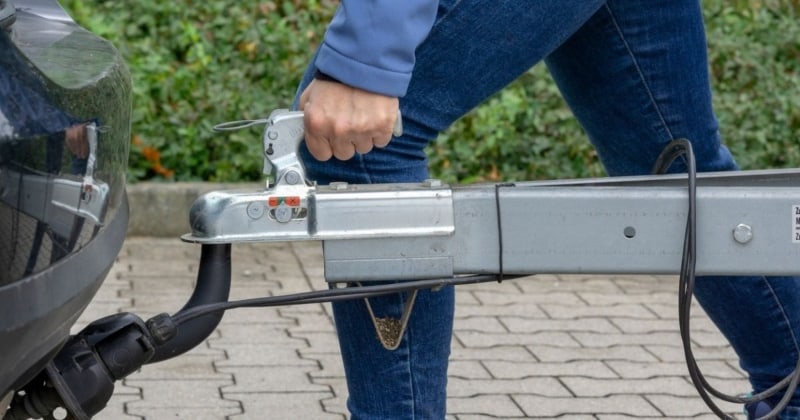
Before we get into what tongue weight is, it’s helpful to know what part of your travel trailer the tongue. The tongue is the portion of the RV that connects to your vehicle. It’s also known as the hitch.
Each travel trailer has a tongue that looks a bit different, but they all function to provide a secure connection to your truck or SUV.
Gross Tongue Weight Rating (GTWR) is the maximum amount of weight that can be applied to the trailer hitch before impacting the stability of the trailer and vehicle.
3 Ways Tongue Weight Impacts Your Travel Trailer
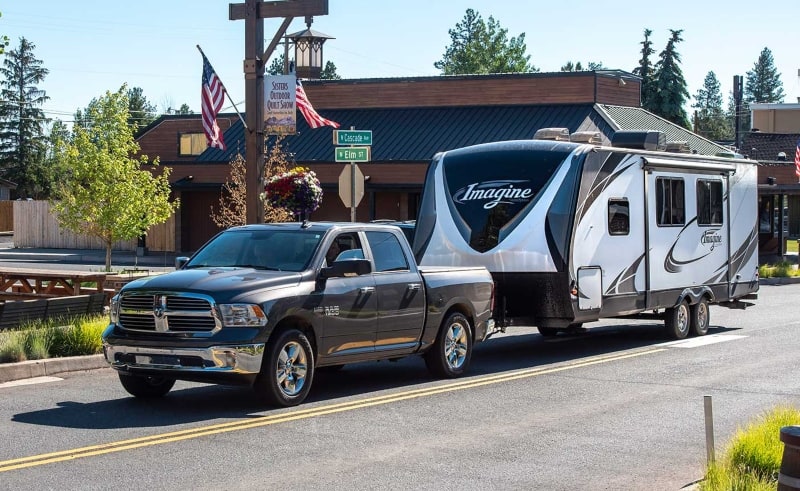
Tongue weight is one of the most important considerations when you’re pulling a camper. It’s also often an overlooked factor. Improper tongue weight can significantly impact your trailer, vehicle, and safety.
1. Reduce Your Tongue Weight on Your Travel Trailer For Safety
Safety is probably the most important consideration for proper tongue weight. When your RV tongue weight is either too light or too heavy, it becomes unsafe to pull your trailer.
Overloading your trailer’s tongue can limit braking, steering, and trailer sway. All of these can cause dangerous towing conditions for both you and other vehicles.
2. Prevent Damage When You Reduce the Tongue Weight on Your Travel Trailer
Since the tongue is your connection point to your vehicle, proper tongue weight protects against damage. Too much weight can stress your truck’s suspension, tires, and frame. Not enough weight can cause the RV to slip off the ball. This can damage both your trailer and your vehicle.
3. Reduce the Tongue Weight On Your Travel Trailer For Better Control
Along with safety, it’s important to understand that tongue weight directly impacts your ability to control your vehicle and trailer. When towing, if your tongue weight is too light, the trailer can sway, making it very difficult to maintain control of the trailer.
If the tongue weight is too heavy, you’ll find it very difficult to steer your vehicle. Turning corners or going around curves can be particularly challenging with too much tongue weight.
Can Tongue Weight Be Adjusted?
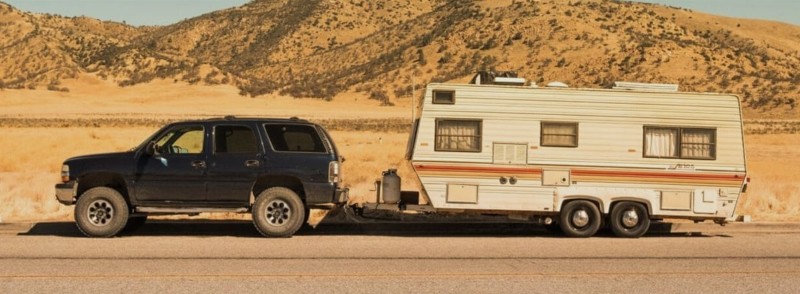
Now that you know why tongue weight is so important, you’ll be happy to know that tongue weight is adjustable. Here are 5 ways to easily adjust the weight on your RV’s tongue.
5 Steps to Reduce Tongue Weight on a Travel Trailer
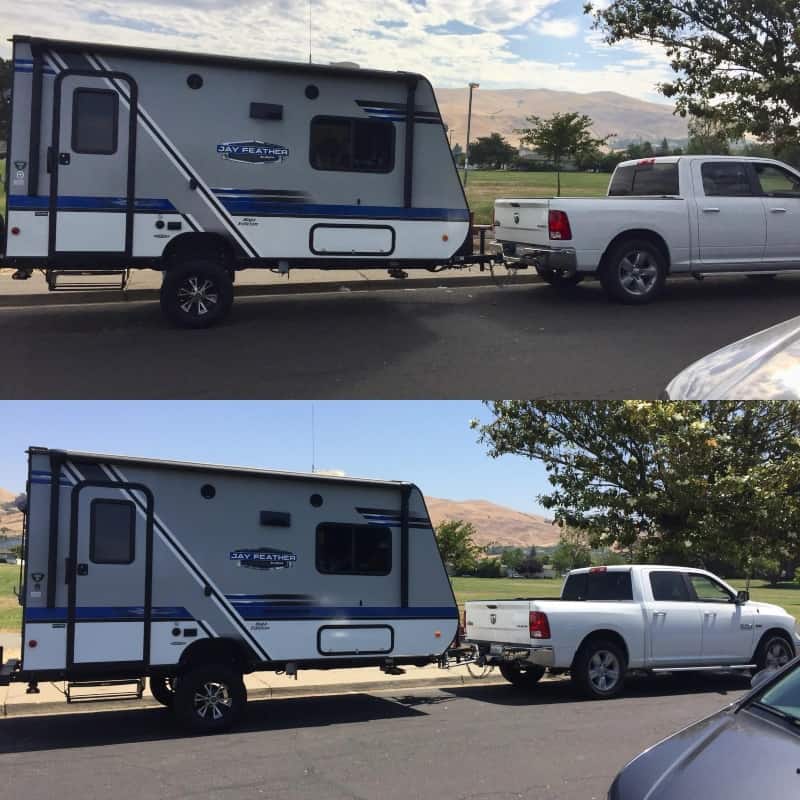
1. Measure the Tongue Weight First
Knowing how much your travel trailer tongue weight is, is the first step in reducing tongue weight. For smaller campers, you can use a basic bathroom scale. For larger RVs, you can use a trailer tongue weight scale. If you aren’t up for that, you’ll have to use a weigh station or public scale.
2. Know the Trailer’s Gross Vehicle Weight Rating (GVWR) Capacity
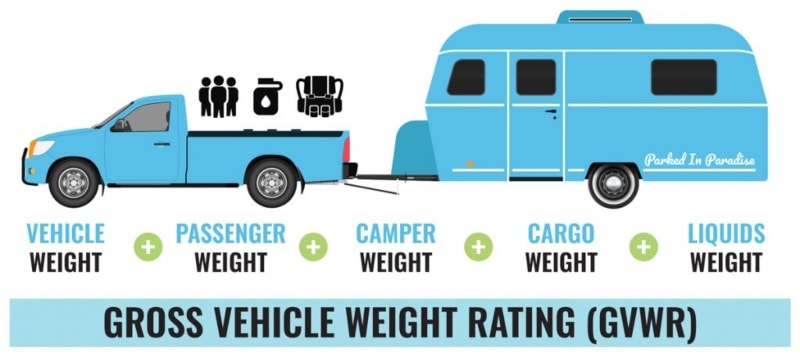
The GVWR is the maximum amount of weight your travel trailer can safely hold with people, gear, food, equipment, and pets. This value is necessary for calculating the tongue weight of your camper.
If you’re unfamiliar with the RV weight terminology, here’s a great chart and explanation to use.
3. Follow the “3/5 Goes in Front” Rule
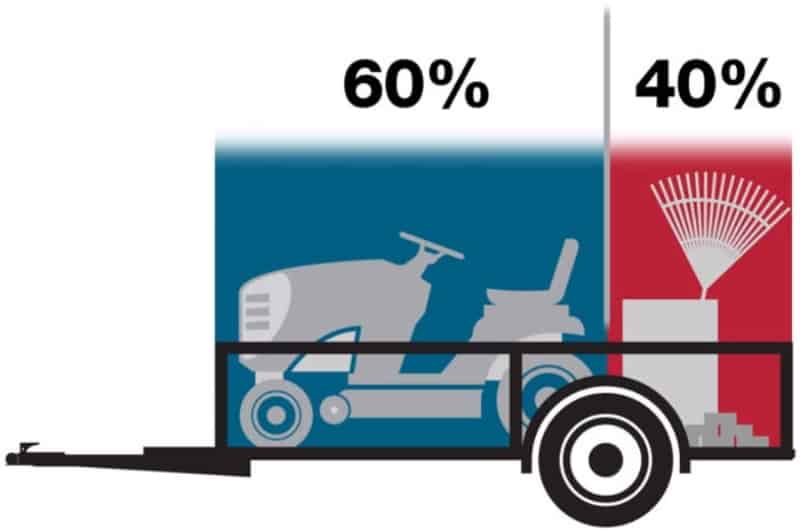
Balancing the weight distribution around your trailer’s axle makes a big difference in tongue weight. For ideal weight distribution, 3/5 or 60% of your cargo weight should be placed in front of the axle.
4. Change the Hitch Ball Height
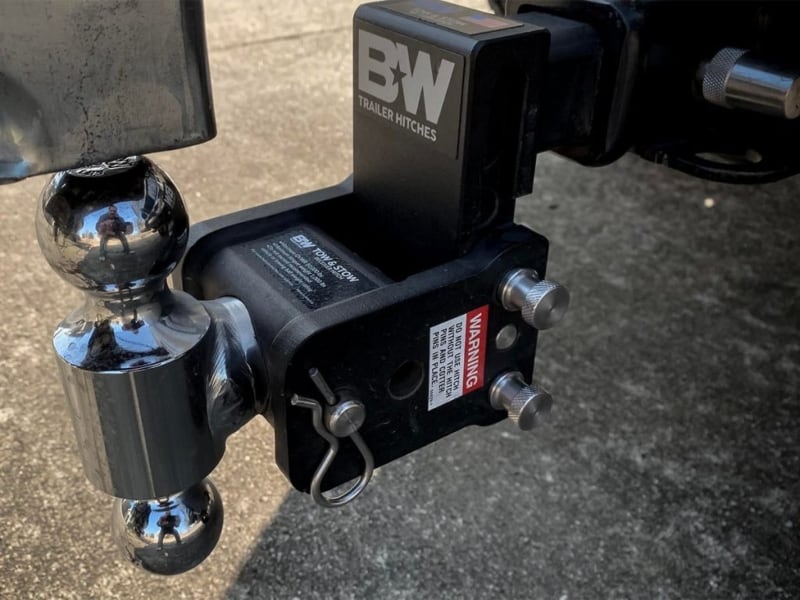
A properly leveled trailer will reduce the force placed on the vehicle hitch. If your hitch ball is too high or too low, this can impact the tongue weight. Using an adjustable height ball hitch, like the B & W T10048 Tow & Stow Adjustable Trailer Hitch, can help with proper tongue weight.
5. Use Sway Accessories
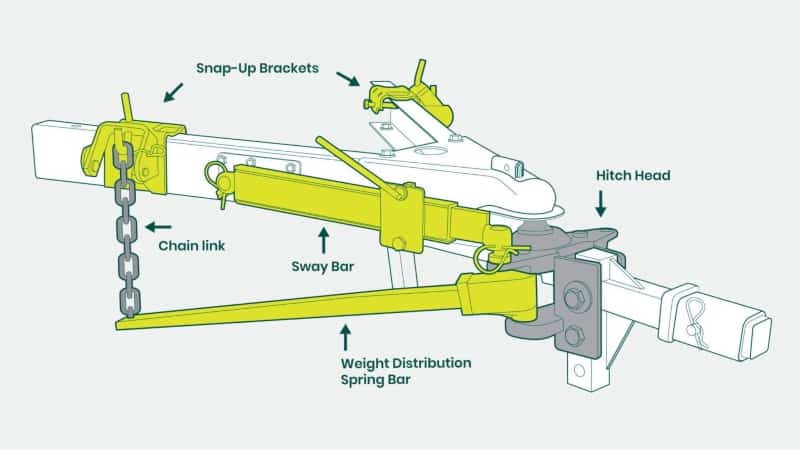
Sway accessories should never be used as an alternative to proper tongue weight. However, they’re a nice added safety feature. Sway accessories will keep your trailer from erratically swaying when traveling at higher speeds. Sway accessories are great safety features and are handy even for small travel trailers.
How Much Weight Should Be on a Trailer Tongue?
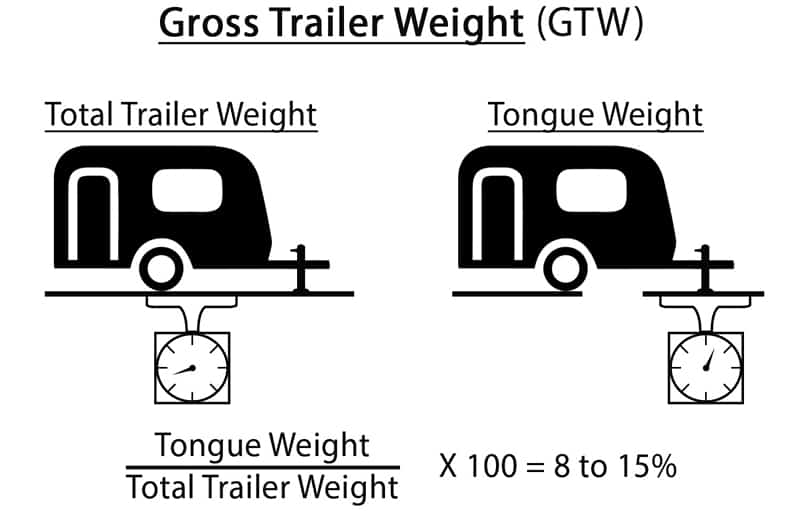
In general, tongue weight should be between 10% and 15% of the gross towing weight (GTW) for your ball-mounted hitch trailer. For instance, if your trailer’s GTW is 2,000 pounds, the tongue weight will be between 200 and 300 pounds.
If you really want to get this weight correct, include the weight of your cargo in the calculations for a more accurate idea of the tongue weight.
Remember, your tongue weight is greater if you have a gooseneck or fifth wheel trailer. The ideal tongue weight for these camper types is between 15% and 30% of the GTW.
What Happens If You Have Too Much Tongue Weight?
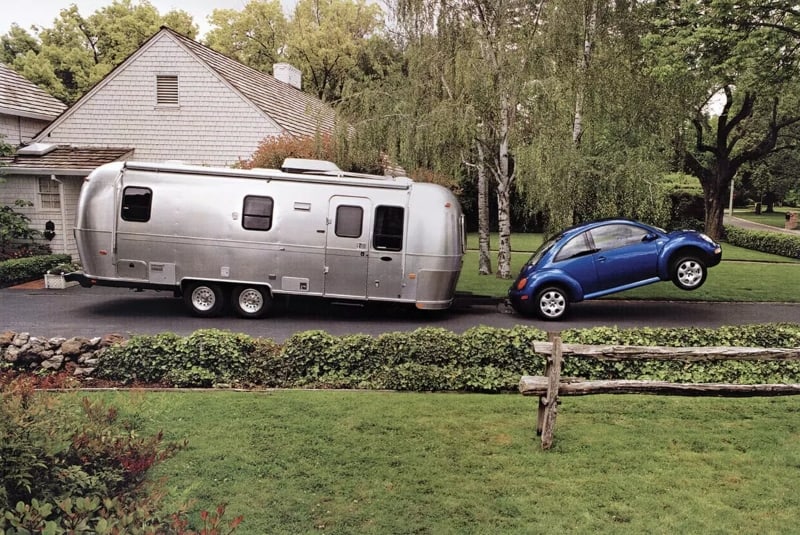
Your ability to steer your vehicle is the most significant impact if your tongue weight is too heavy. Combining that with a much slower stopping time and overloading your trailer’s tongue can be quite dangerous.
Besides safety, too much weight on the tongue can also impact driving performance. It can also increase wear and tear on your vehicle tires, suspension, brakes, and transmission.
What Happens If My Tongue Weight Is Too Light?
Trailer sway is the most significant problem caused by too little tongue weight. When your trailer sways precariously when towed, you risk inadvertently disconnecting the trailer from your vehicle while traveling. Sway is dangerous for you and other drivers. It can also result in significant damage to your vehicle and camper.
3 Factors That Impact Tongue Weight
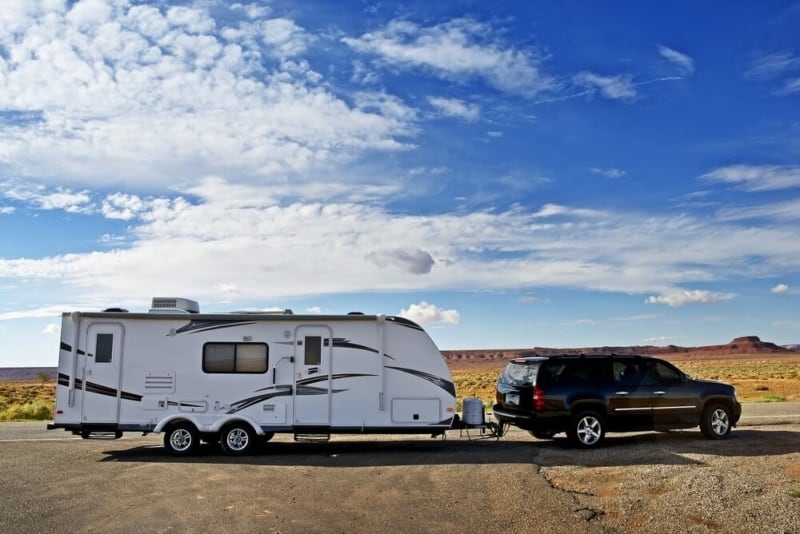
1. The Payload
When discussing the payload for your camper, we consider quantity and placement. Knowing your RV’s GTW is essential, so you don’t overload your trailer. Then remember to distribute your gear inside your trailer properly. Sixty percent of your trailer weight should be in front of the trailer’s axle.
2. The Tongue
The shape, length, height, and weight of your RV’s tongue will change the tongue weight for your trailer. Remember that tongue weight is the force placed on your vehicle’s hitch. Changing the dimensions of the tongue will change how this force is exerted on your vehicle.
3. Trailer Axle Positioning
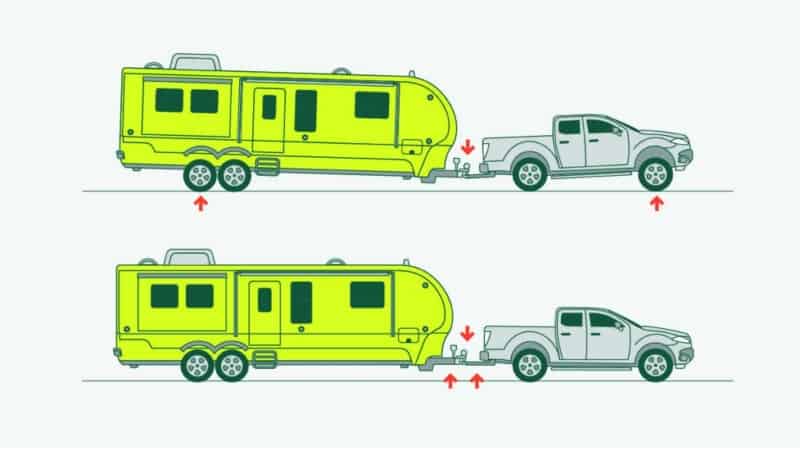
Most travel trailers are a kind of lever. The axle is the fulcrum of the lever. The point where the axle is placed will change how weight is distributed through the trailer. It’ll also change how you load gear into your trailer.
FAQs About Reducing Tongue Weight on a Travel Trailer
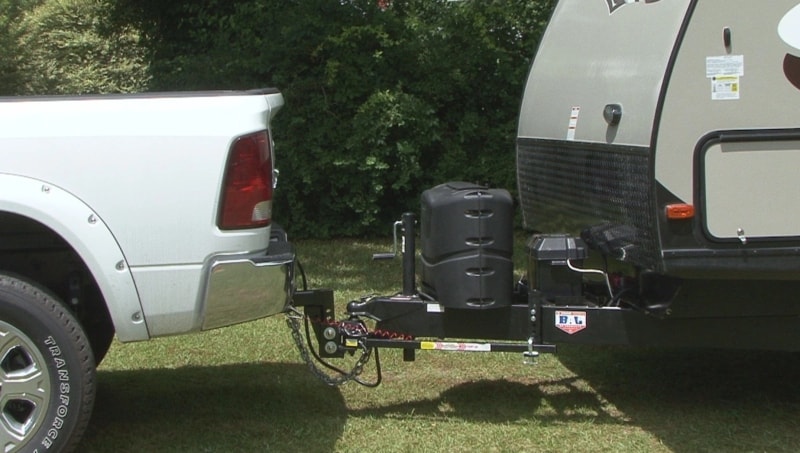
Will a Weight Distribution Hitch Reduce Tongue Weight on a Travel Trailer?
The easy answer to this question is no. A weight distribution hitch does not reduce tongue weight. This type of hitch changes how the weight is distributed on the tow vehicle. More weight is passed to your vehicle’s front axle, allowing for a more level driving condition.
Does Hitch Height Affect Tongue Weight?
Yes, height hitch does affect tongue weight. Think again about our lever and fulcrum. If your vehicle’s connection point is too high, the tongue weight will be less. If the hitch on your vehicle is too low, it will increase the tongue weight.
How Does a Hitch Extender Affect Tongue Weight?
If you’ve done all the right things and still need to reduce tongue weight, a hitch extender can help. Depending on the length of the extender, using a hitch extender can reduce your tongue weight by up to 50%.
When Do You Need a Weight Distribution Hitch?
There are indicators that will tell you that you need a weight distribution hitch:
- Your trailer weighs more than 50% of your vehicle weight.
- You notice your vehicle’s headlights point upward when towing.
- The back of your truck is visibly lower when your camper is attached.
- You experience sway when pulling your RV.
- It is difficult to steer your vehicle.
- Your stopping time and distance increase significantly.
Is It Okay to Use a Hitch Adapter?
Using a hitch adapter is not a great idea for larger-size travel trailers. However, a hitch adapter for smaller trailers can help reduce tongue weight and provide a clearer view of your camper.
It is also valuable to note that hitch adapters do create a “weak” point when towing. Besides not being as strong, this junction can also cause sway if the adapter doesn’t fit well.
What Is the Proper Tongue Weight?
Proper tongue weight is a calculated value based on the gross weight of your trailer. The gross weight of your trailer includes the trailer and all the passengers and gear. The proper tongue weight for ball-hitch mounted trailers is between 10% and 15% of the gross trailer weight. For 5 th wheel and gooseneck trailers, the proper tongue weight is between 15% and 35% of the gross trailer weight.
Additionally, most travel trailer manufacturers will provide a range of tongue weights that are ideal for their travel trailer based on the trailer’s dry weight and the GVWR with the maximum payload weight (a.k.a. Cargo Carrying Capacity or CCC).
Final Thoughts on Reducing Tongue Weight on a Travel Trailer
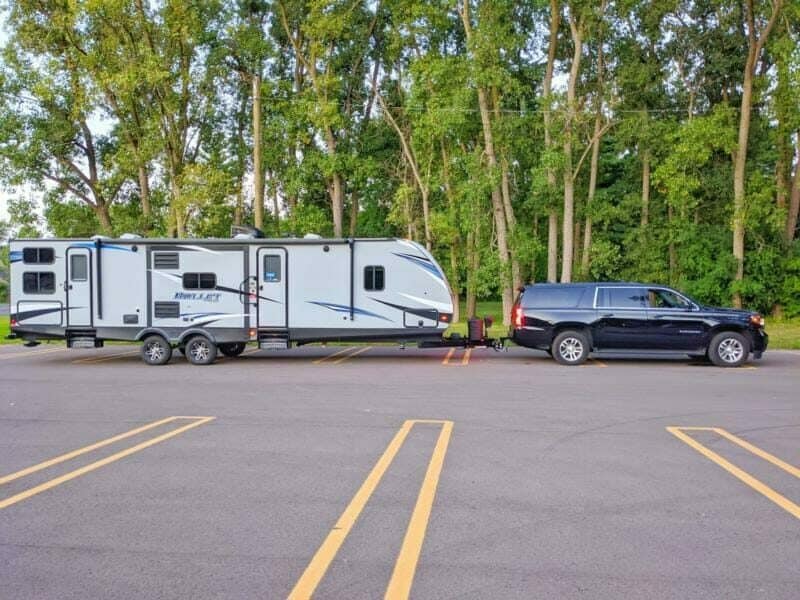
Proper tongue weight is important in the safe towing of your travel trailer. Fortunately, to reduce tongue weight, travel trailer owners must make a few adjustments to their camper and vehicle.
In many cases, the best solution is to redistribute your gear inside your trailer. No matter the size or style of the camper, proper tongue weight is essential for a fun and safe travel experience.
About the Author:
Jason Gass is a full-time freelance writer and part-time RVer whose goal is to share great stories around a campfire with good friends.
When he’s not working, he spends most of his time camping, searching for the best breweries, and road-tripping in his teardrop trailer with his wife, daughter, and two dogs.

Recent Posts
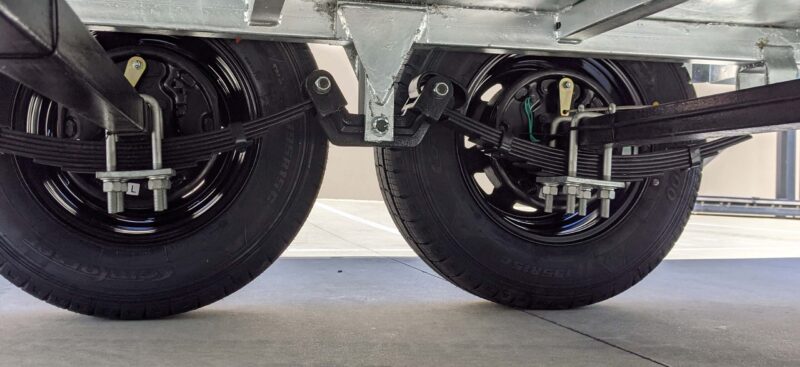
How Long Should Travel Trailer Brakes Last?
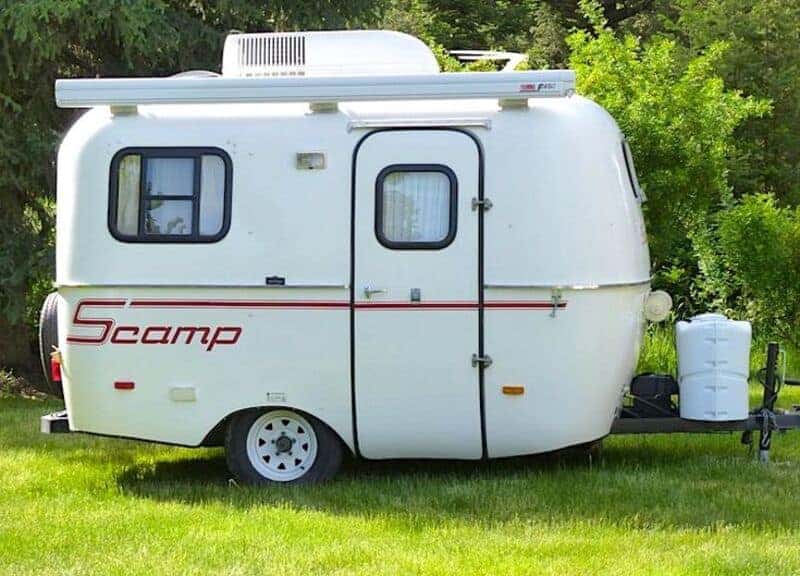
10 Best Travel Trailers Under 2000 lbs For 2024

Guide to Measuring Tongue Weight
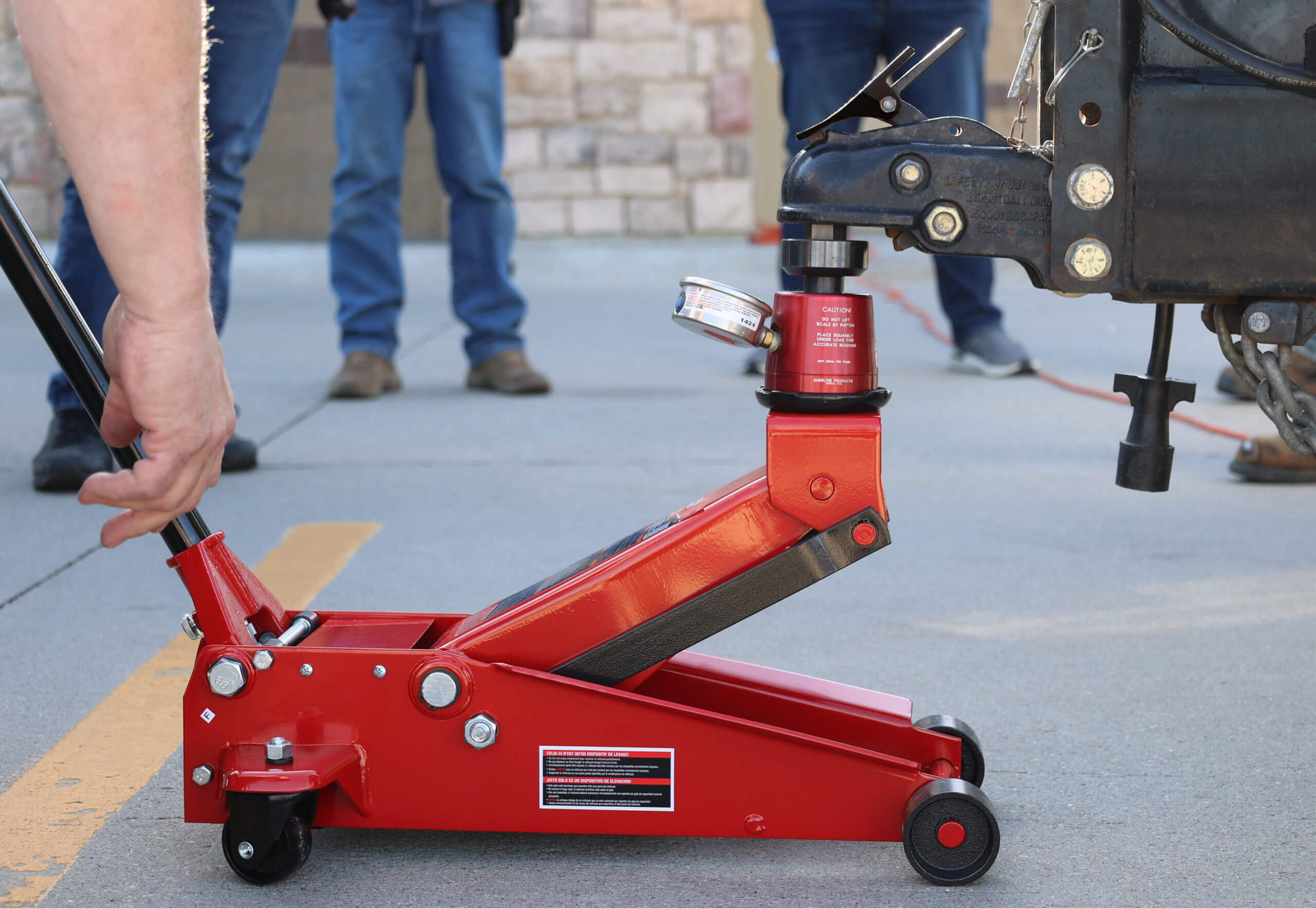
Making sure you understand the various weight needs and limitations associated with your rig is one of the most important things you can do to keep your family and yourself safe while towing a travel trailer. Ensuring your tow vehicle and hitch are capable of towing your trailer, and its cargo, will help you maintain control of the trailer while on the road. Stay safe while towing by properly measuring tongue weight .
Table of Contents
What is Tongue Weight?
Tongue weight (TW) is the downward force applied at a vehicle-trailer connection point when your trailer is connected for towing. The tongue weight should be between 10-15% of the total trailer weight. Measuring tongue weight is essential to be certain that your trailer is loaded properly. The other weight to keep in mind is the (GTW) gross trailer weight.
Tongue Weight vs. Hitch Weight
The phrase “tongue weight” and “hitch weight” are both often seen when discussing trailer towing. Don’t let these two terms confuse you, because they both mean the same thing. When discussing fifth wheels, you may see “pin weight,” which is also the same concept.
Why Is Tongue Weight Crucial for Towing?
Measuring tongue weight is important when towing. Without knowing this piece of information, you may end up creating a driving hazard to yourself and others on the road. Too much tongue weight can cause your vehicle to be less responsive to turning and braking, making it difficult to control the trailer while driving. Too little tongue weight is also an issue and can cause trailer sway. Trailer sway is the most common problem that occurs when tongue weight is incorrect. Trailer sway can become very dangerous because it causes the trailer to fishtail back and forth and this can be unexpected to the driver and difficult to regain control.
Too heavy of a downward force will effect steering, too light means risk for trailer sway.
With the incorrect tongue weight, you may also experience:
- Rear tire overload
- Tire blowouts
- Brakes that become unresponsive
- Traffic accidents
- Serious damage to your vehicle or trailer
- Personal injury or even death
Measuring Tongue Weight on a Trailer
Measuring tongue weight before you hit the road isn’t overly complicated. There are a few ways to determine tongue weight.
Using a Tongue Weight Scale
The easiest way to calculate tongue weight is with a tongue weight scale. These have come a long way with modern technology. They can be purchased at various towing supply shops or online for under $200.00. They are small and designed specifically for measuring tongue weight. Before taking the measurement, make sure that you are loaded down with everything you intend to haul. This includes camping gear if you are hauling a travel trailer for camping. The steps for measuring tongue weight with a tongue weight scale are as follows:
- Load up your trailer and/or put all of your gear inside and park the vehicle and trailer on a flat, hard, level surface.
- Place the tongue weight scale beneath the tongue jack and lower it down until the jack is pressing on the scale.
- Avoid lowering any other jacks, then detach your trailer from the truck and take your reading from the scale.
Commercial Scale for Measuring Tongue Weight
Another easy method for measuring tongue weight is to use a commercial vehicle scale. You can typically find these at a truck stop, quarry, or material supply center. Once you’ve figured out where you will be weighing your trailer, make sure it is loaded up with everything you plan to haul. Follow these steps:
- Weigh your vehicle without the trailer hooked up.
- Weigh your vehicle again with the trailer attached but do not let the wheels of the trailer onto the scale or you will get an inaccurate number. You want just the weight of the vehicle with tongue weight, not the entire weight of the trailer (you will get this measurement later).
- Then take the weight of your vehicle with the trailer attached and subtract the weight without the trailer attached and this equals your trailer tongue weight.
Measuring Tongue Weight for a Weight Distribution Hitch
Using a weight-distribution hitch is an incredibly helpful piece of equipment when towing a trailer. It is typically not recommended to tow a trailer any long distance without one. Measuring tongue weight is necessary when selecting the proper weight distribution hitch. You will need to know the weight of the gear you plan to load behind the rear axle of the tow vehicle and add this amount to the total tongue weight. Do so by following these steps:
- Weigh your vehicle with the gear you intend to haul.
- Weigh your vehicle without the gear.
- Subtract the weight without gear from the weight with gear to get the total gear weight.
- Add the total weight of your gear to the tongue weight.
- Select a weight-distribution hitch that will support the amount of total tongue weight.
How to Determine Tongue Weight Adjustments
Every towing vehicle is rated for the amount of weight it can safely tow. It is a good idea to check that you are not trying to tow more than your vehicle can handle. Weigh your trailer with all gear loaded. If you’ve chosen to determine the tongue weight on a commercial scale, you can easily check your trailer weight:
- Pull your tow vehicle and trailer onto the scale to weigh them together. This is your Gross Combined Vehicle Weight (GCVW)
- Since you already have the weight of your vehicle from the previous steps used for measuring tongue weight, simply subtract the weight of your tow vehicle from the GCVW.
- An easy equation to use is: GCVW – GVW (Gross Vehicle Weight) = GTW (Gross Trailer Weight)
You may find that you are over or under the appropriate tongue weight or gross trailer weight for your vehicle. If this is the case, you will need to adjust your cargo. If the tongue weight is too low, try moving some cargo closer to the front of the trailer to add more weight to the tongue. If the tongue weight is too high, you can try moving cargo further away from the tongue. As you are adjusting your cargo from front to back, try to keep it as balanced on the left and right side as possible. If your gross trailer weight is too high for your vehicle, you will need to remove cargo or you could risk damaging your tow vehicle.
Install Blue Ox SwayPro Weight Distribution Hitch for Safe Towing
Measuring tongue weight, trailer weight, and vehicle weight are key steps in creating a safe towing experience, but sometimes trailer sway can occur due to weather or poor road conditions. Having a weight distribution height that prevents trailer sway before it starts adds a layer of safety for you and other drivers on the road. Rather than attempting to manage trailer sway once it has begun, the SwayPro weight distribution hitch stops it from occurring. Trunnions on each side of the SwayPro hitch head use a caster effect, which works in conjunction with spring bars, to keep the trailer in line. SwayPro is one of the s af est and easiest-to- u se sway prevention devices currently available. To f ind out which SwayPro is best for you , visit the Blue Ox website.
Tags: measuring tongue weight rv towing accessories travel
Keep Reading
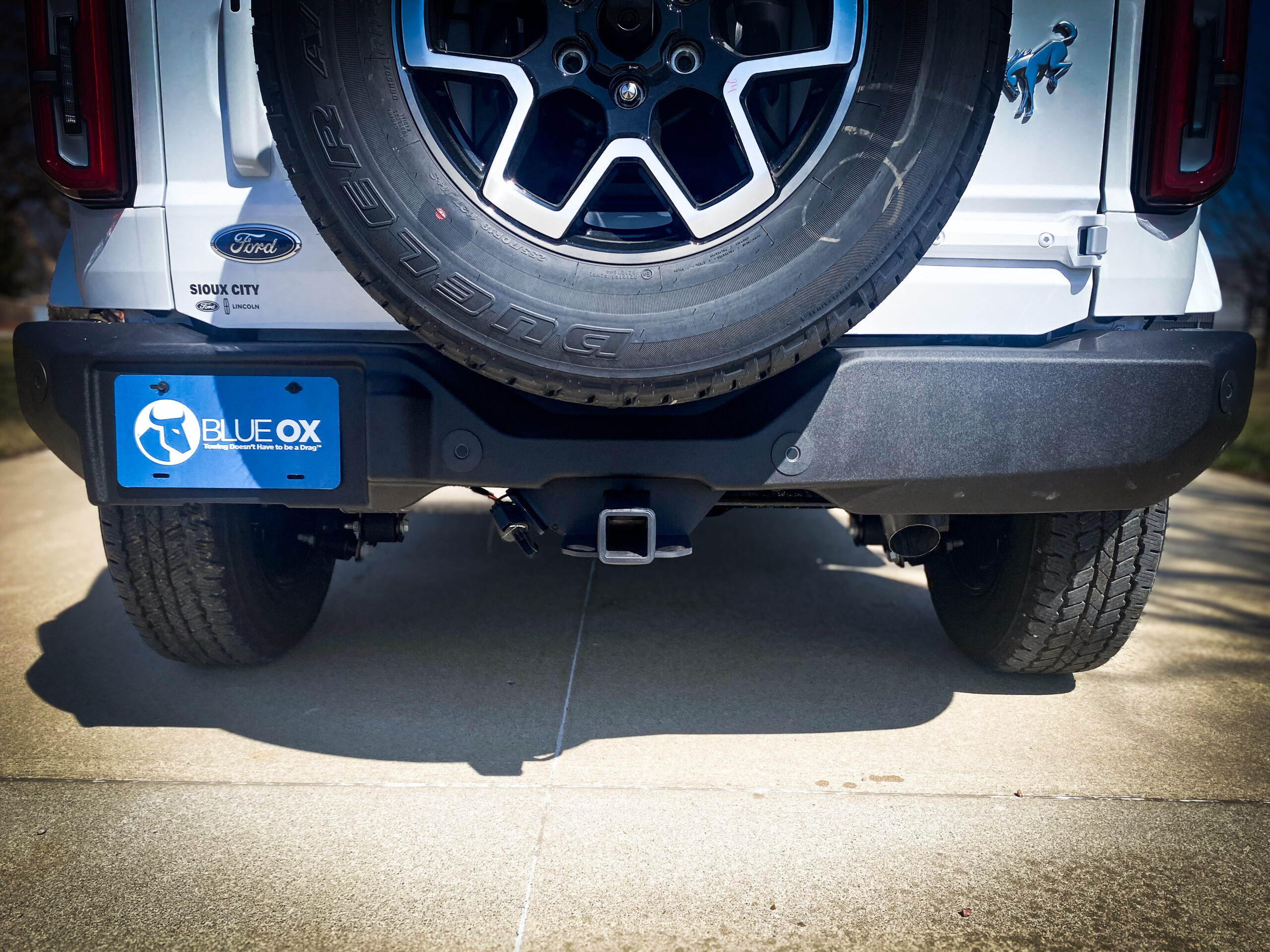
Receiver Hitches: What Are They and Can You Add One to Your Vehicle?
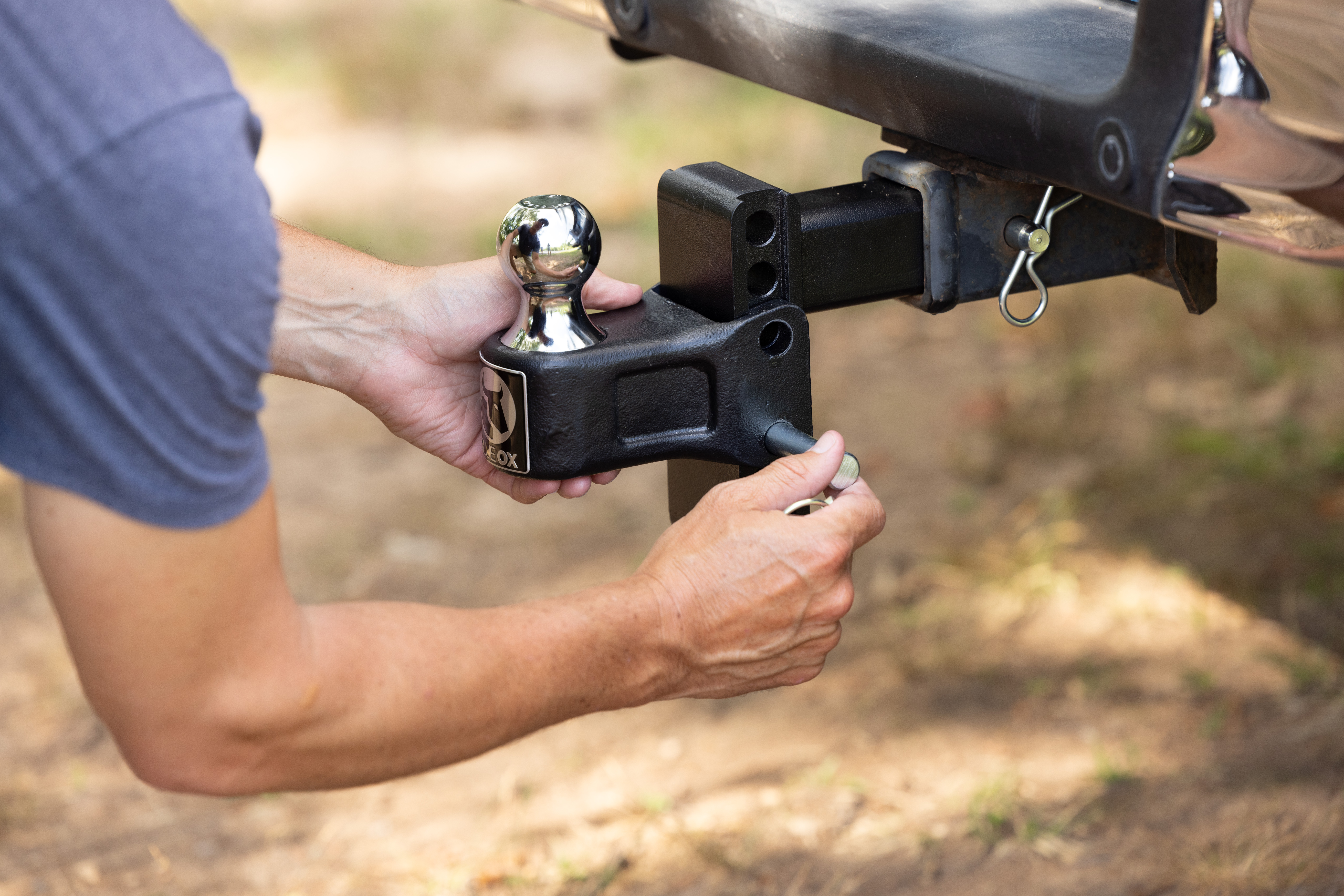
Ball Hitch Size Guide – What Size Should You Use?
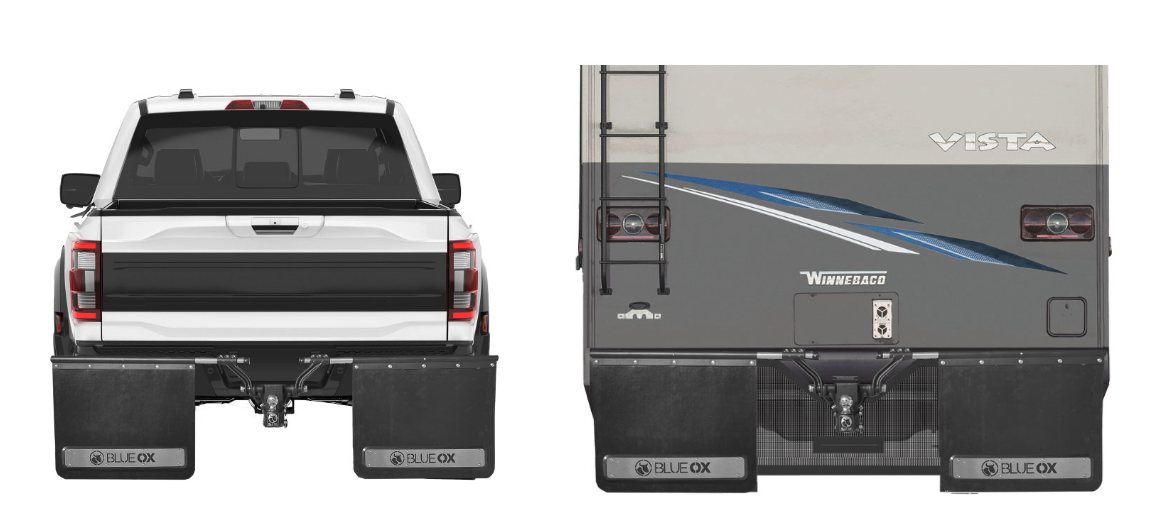
Are Mud Flaps Worth It When Towing?

All You Need to Know About Trailer Sway & How to Prevent It

How to Level Your Camper with Blocks Like a Pro
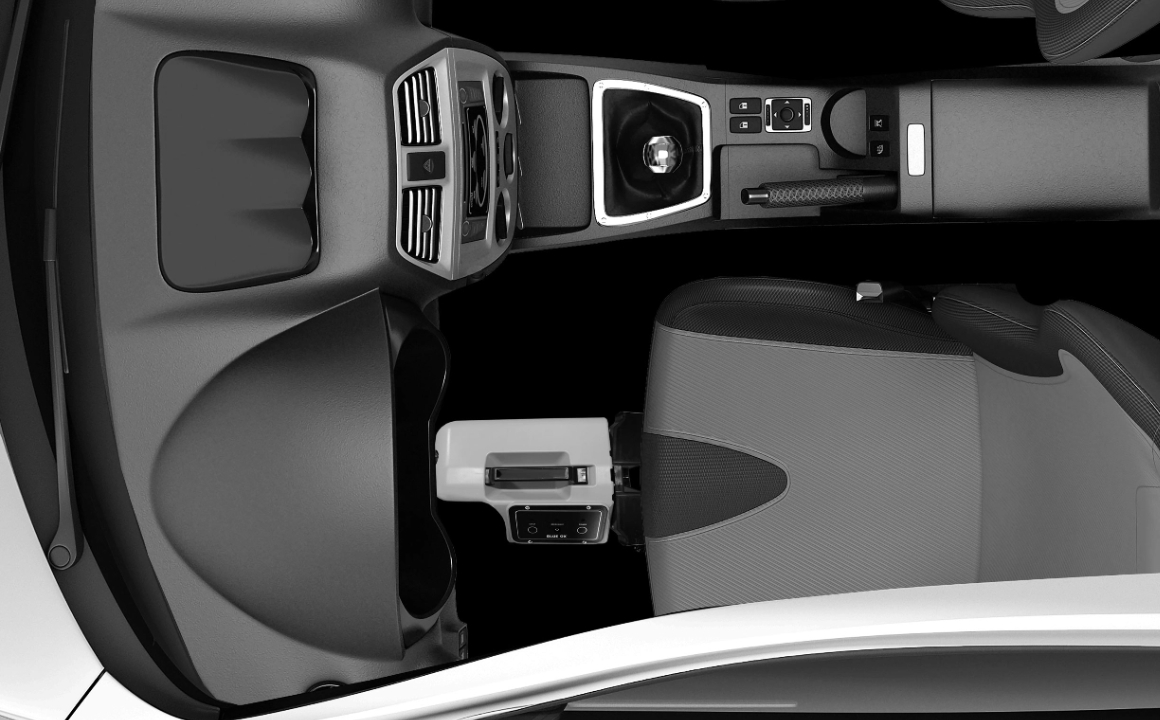
Flat Tow Brake Systems and Why The Patriot Brake Is The Best

Your Shopping Cart
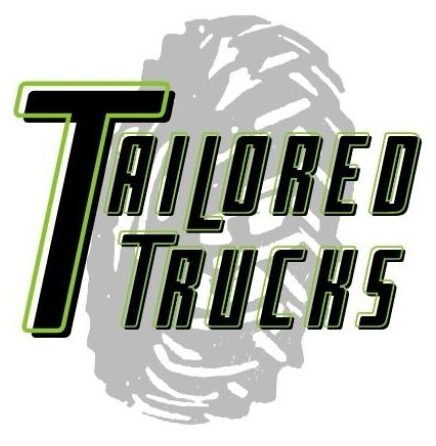
What is trailer tongue weight? & How to Measure It
You may be towing for the first time, have come across an article that mentions tongue weight, or may see a max tongue weight listed in your owner’s manual.
Either way, you have come to the right place. This article will walk you through what exactly trailer tongue weight is and how it can be measured.
Tongue weight is the amount of weight that is exerted on a trailer hitch from the trailer. It is important to know the trailer tongue weight to know that you are towing safely and have not exceeded the payload capacity of your vehicle. The tongue weight of a trailer should be between 10-15% unless stated otherwise by the manufacturer.
There are three main ways to weigh your tongue weight and that is with a:
- Commercial Grade Truck Scale
- Bathroom Scale
- Tongue Weight Scale

Table of Contents
What is Trailer Tongue Weight?
Tongue weight is the amount of weight that is exerted on a trailer hitch on a vehicle.
It tells you the amount of weight that is being held up by the towing vehicle.
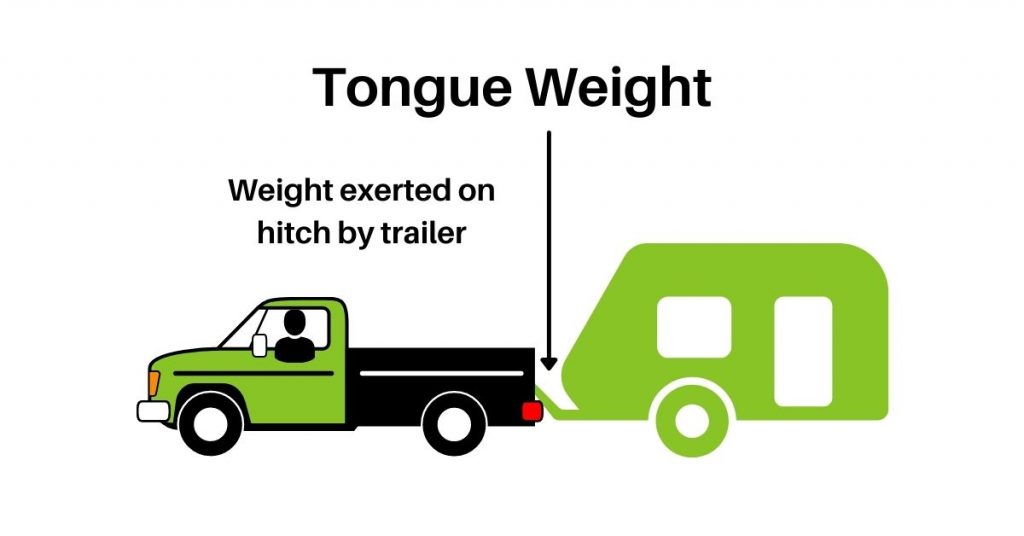
Tongue weight is quite different than towing capacity. Towing capacity refers to the amount of weight that can be pulled by a truck and the tongue weight is only the amount of weight that the truck actually experiences due to the trailer being attached.
What’s the importance of Tongue Weight?
Knowing the tongue weight of your trailer is necessary for three reasons.
- It reduces trailer sway
- Determine whether payload capacity is exceeded
- Ensures the tongue weight can be handled by the towing vehicle.
Trailer Sway
Trailer sway is a very dangerous phenomenon that occurs on the road. Unfortunately, not everybody who loads a trailer thinks about the weight distribution of the contents of the trailer.
Trailer sway is the uncontrollable nature of an imbalanced trailer. With poor weight distribution in the trailer, any small change in force can cause the trailer to swing out of control. When the tongue weight is appropriately measured, trailer sway is virtually non-existent.
The video below is a great, quick demonstration of this importance
Payload Capacity
Payload capacity is the maximum amount of weight that can be exerted on any vehicle. It is a value that is calculated from the GVWR.
Related: What is GVWR?
Payload Capacity is calculated by subtracting the curb weight from the GVWR (Gross Vehicle Weight Rating). This value is the maximum amount of weight that can be added to the vehicle in terms of cargo, passengers, AND TONGUE WEIGHT!
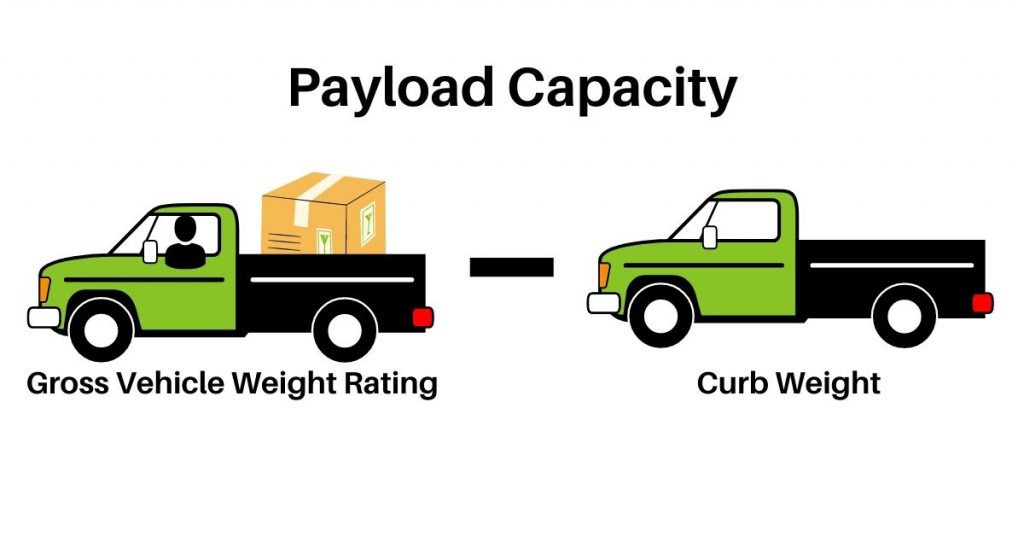
People who tow often forget that payload capacity must be a concern. It is easy to make sure that you are not towing more than your truck can handle, but you also need to make sure that the tongue weight of the vehicle will not cause the payload capacity to be exceeded.
This means that the cargo weight, passenger weight, plus tongue weight cannot ever exceed the payload capacity of the vehicle.
In order to make sure this doesn’t happen, you need to know the tongue weight of your trailer.
Maximum Tongue Weight
There are three ways in which trailers can be attached to a truck with conventional towing.
The hitch ball could be installed on the bumper, a hitch receiver could be installed with a trailer without a weight distributing hitch, and a trailer with a weight distributing hitch can be attached to a hitch receiver.
Oftentimes, trucks and other vehicles will list a maximum trailer hitch tongue weight. For example, Ford F150 lists the maximum tongue load for trailers attached to a bumper and with/without weight-distributing hitches. (See chart below)
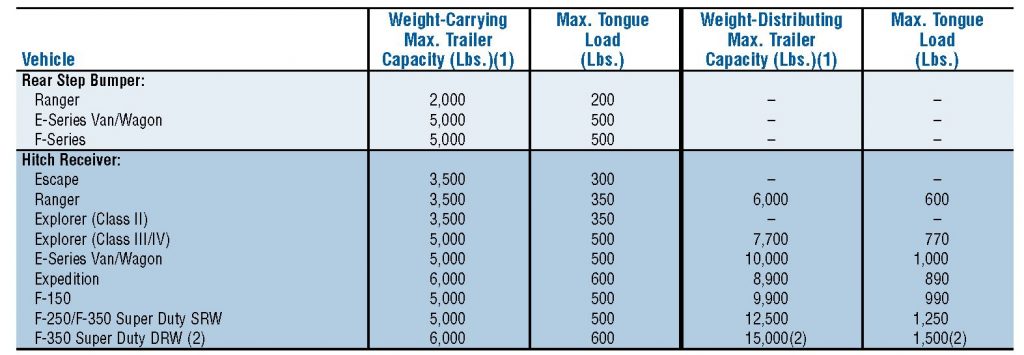
There are also limitations on the type of hitch receiver that will determine whether or not you are trying to tow more than your hitch can carry. Curtmfg does a great job breaking down the different types of hitches and hitch classes if you’re interested.
What is the best tongue weight?
For safety reasons, tongue weight should be between 10-15% of the total trailer weight.
This will provide a well-distributed trailer weight that will reduce trailer sway. This tongue weight will typically allow the trailer to stay flat, which is pretty important. You want to make sure that when you load a trailer, the back end of the trailer is the same height as the front end.
How to determine the Max Tongue Weight?
Max tongue weight may be listed in the owner’s manual (such as with Ford) but may also just simply need to be calculated.
The absolute max tongue weight of a vehicle will be the towing capacity times 10-15% .
So how do you calculate towing capacity? Well, I made an article just on that to walk through a full example of How to Calculate Towing Capacity (and included a calculator to make it easier).
But you must remember this is the max tongue weight if towing the max trailer weight. At any given point, the max tongue weight is simply the trailer weight times 10-15% .
This trailer weight is both the curb weight plus any cargo added to the trailer . This can be measured by either using a commercial scale or calculated manually.
You can find the curb (or base weight) of the trailer in the owner’s manual and then you will need to weigh everything you add to the trailer and add this together with the base weight. This will give you the total trailer weight.
How to measure tongue weight
There are three ways to measure tongue weight. In either of these three ways, the key is to isolate the weight that is exerted on the trailer hitch.
When taking the measurement in any of these methods, you need to make sure that the tongue weight does not exceed 15% of the trailer weight or any other listed capacity. This means that the distribution of the weight in the trailer may need to be adjusted a few times before these conditions are met.
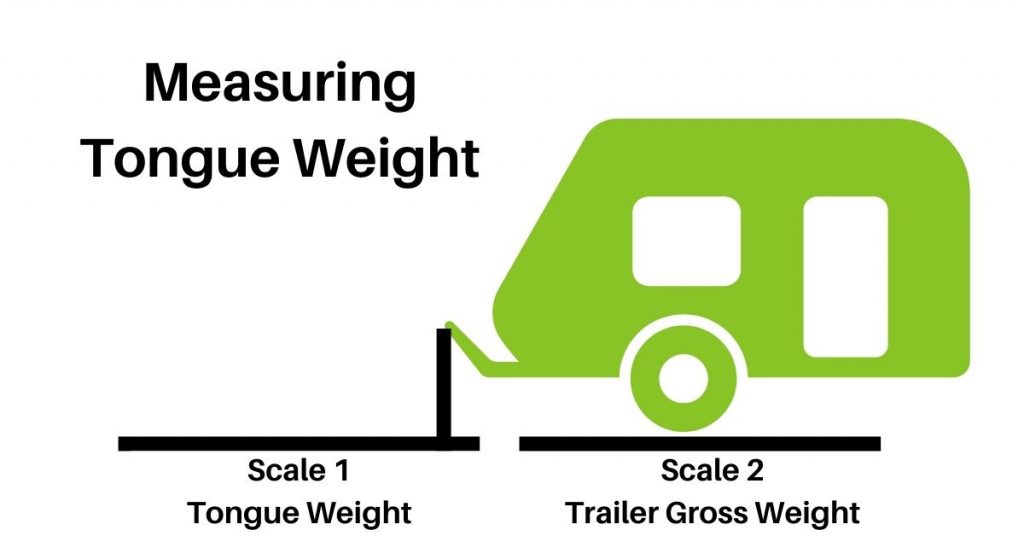
With a CAT Scale/Truck Weigh Station
A CAT scale stands for a “Certified Automated Truck” scale. It is a commercial-grade truck trailer scale. They are equipped at many truck stop weigh stations.
To weigh your tongue weight at this type of scale you must:
- Weigh your truck AND trailer completely on the scale
- Isolate the weight of your truck (get on the scale with the trailer attached, but do not let the trailer wheels get on the scale)
- Remove the trailer and weigh the truck
After you have these three values you can take the weight from number 3 and subtract it from number 2 to get the tongue weight.
Then to determine whether this trailer weight is within the 10-15% range, you can subtract the weight from number 3 from the weight in number 1. Then you must take the tongue weight value calculated above and divide that by the weight calculated in this step.
If the value is between 0.1 and 0.15 then you are within the right spec.
The video below does a great job explaining this procedure.
With a Bathroom Scale
Because it can be challenging to get to a truck weigh station, you may want to measure your tongue weight at home.
Believe it or not, bathroom scales can be used to measure the tongue weight of your trailer. You must consider the maximum weight of your bathroom scale. Before you test the tongue weight on a bathroom scale, you should calculate the 10-15% optimal tongue weight and determine whether your bathroom scale can handle that weight. You can risk breaking your scale if overexerted.
The steps to weigh the tongue weight on a bathroom scale is to:
- Attach the trailer to the truck and load the trailer
- Add a plank to the bathroom scale
- Lower the trailer jack onto the wood (if the trailer does not come with a jack, you will need to find a way to connect the trailer hitch to the bathroom scale
- take measurement
Here is an example of doing that.
There are many bathroom scales that only go up to a few hundred pounds. But for trailers less than 3,000 lbs, this should be able to do the trick so long as the trailer is not extremely front-loaded.
For larger towing capacities, there are bathroom scales that can go as high as 700 lbs, such as the one below.
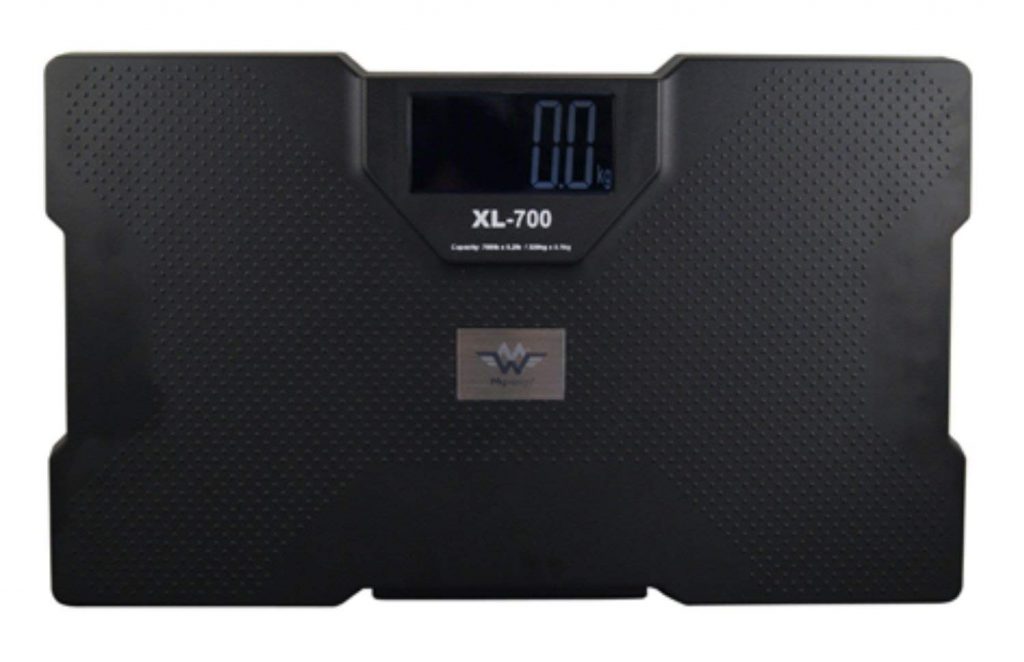
700 lb Bathroom Scale
Amazon Affiliate Link
With a Tongue Weight Scale
If you don’t need or want to do deal with a bathroom scale, there are specific tongue weight scales that can measure tongue weight very easily and up to very high capacities.
Measuring tongue weight with a tongue weight scale is simple:
- Load the trailer such that it is well balanced
- Raise the tongue weight scale to the height of the hitch (with wood, blocks or other structures)
- Rest the trailer hitch on the tongue weight scale
See the video below for a good example.
Tongue weight scales are great because they have higher capacities than bathroom scales and are easily portable. The main brand is Sherline and has scales that go up to 5,000 lbs which means that if you are towing a trailer up to 50,000 lbs, this can measure a tongue weight of 10%.
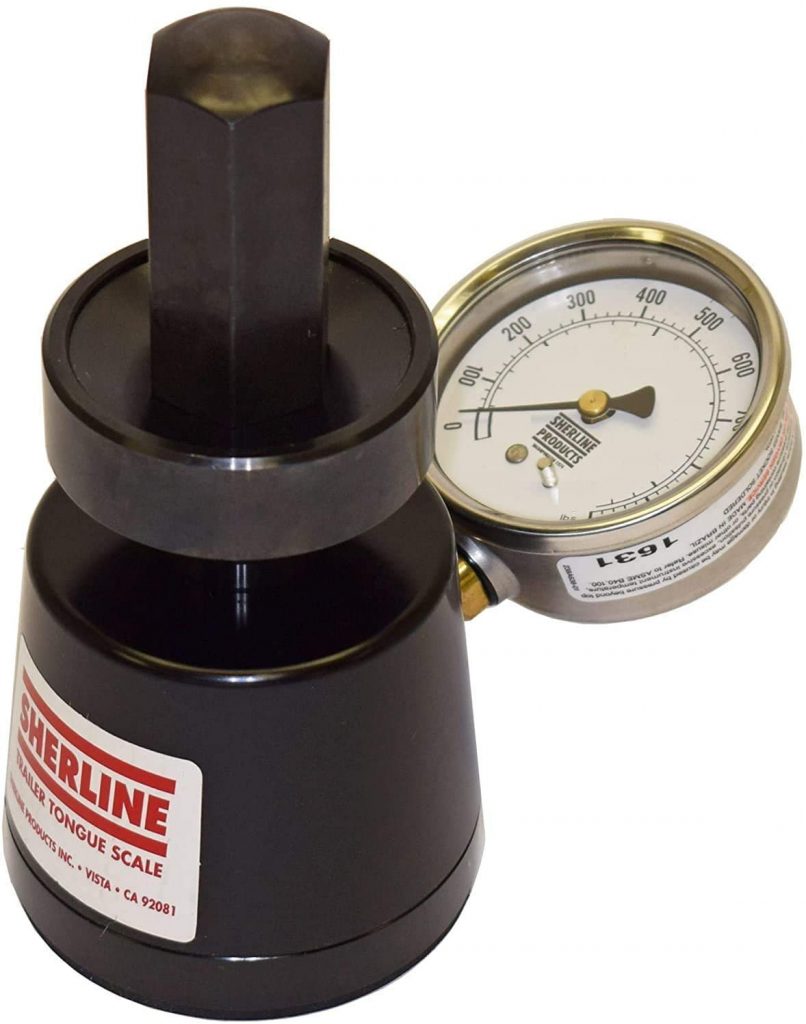
Sherline LM 1000 lb Trailer Tongue Weight Scale
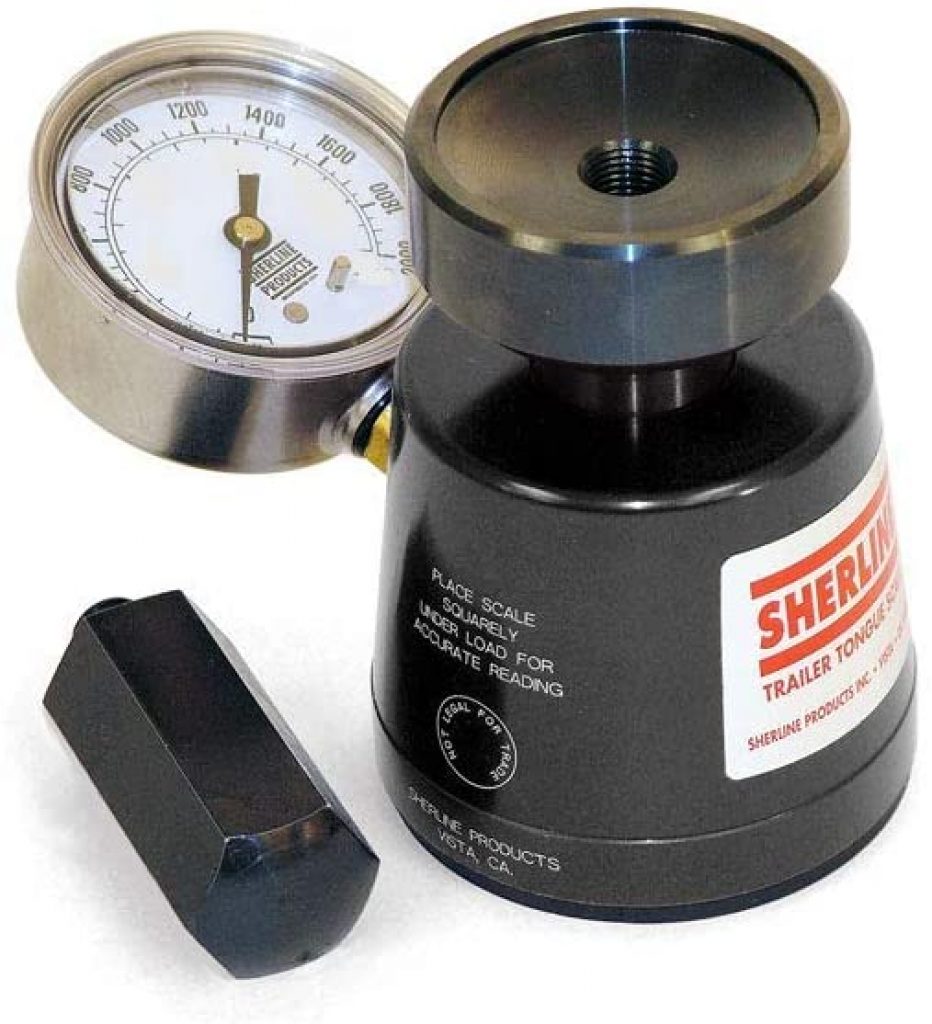
Sherline LM 2000 lbTrailer Tongue Weight
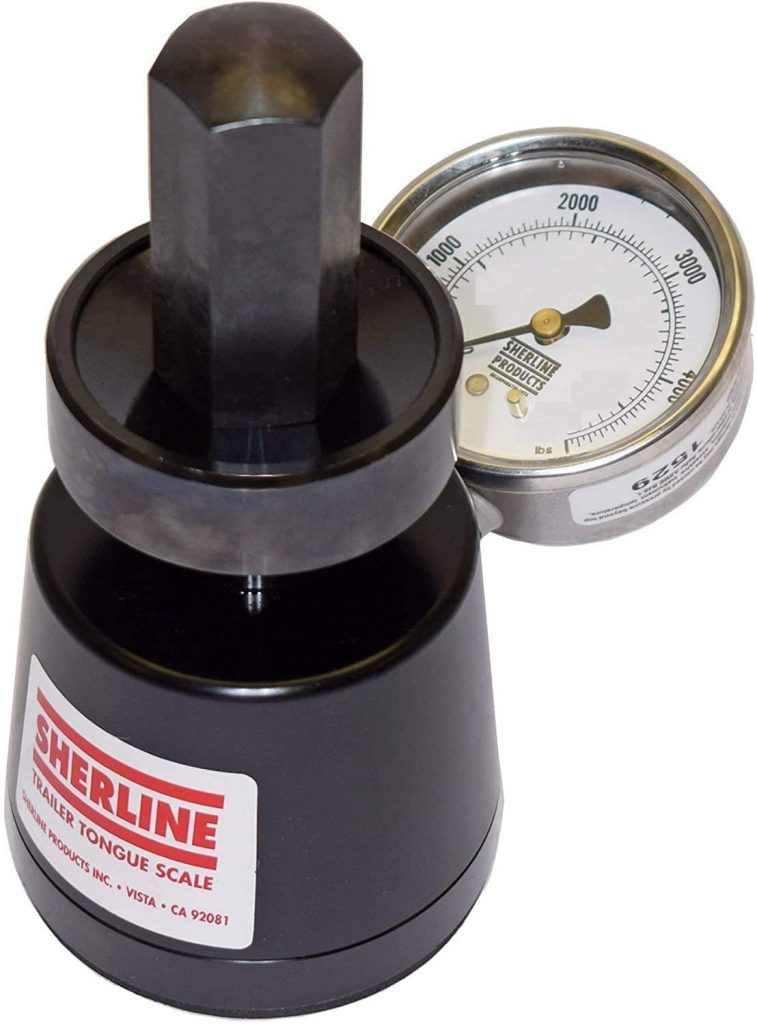
Sherline LM 5000 lbTrailer Tongue Weight Scale
Tongue weight is the amount of weight that is exerted on a trailer hitch from the trailer. It is important to know the trailer tongue weight to know that you are towing safely and have not exceeded the payload capacity of your vehicle.
In my opinion, the best way to measure the tongue weight is with the specifically designed tongue weight scales which can accommodate the largest weight with the most convenient and portable usage.

JOEY TECCHI
I, Joey, am the owner and primary writer for Tailored Trucks. When I'm not writing, I enjoy taking my RAM pickup to the White Mountains for skiing, camping, or ATVing. Thanks for reading!
Leave a Comment Cancel reply
Save my name, email, and website in this browser for the next time I comment.
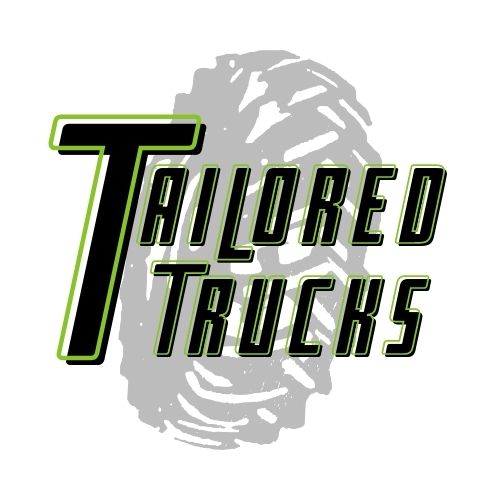
The information posted on this site and all content is for informational, educational, and entertainment purposes. The owners of this site try and intend to keep the information up to date, however, there may be unintentional errors. It is the responsibility of the visitor to confirm information posted on this site. Any decisions made are done at the reader's discretion. Seeking professional help is advised when making any changes to your vehicle.
Links on this site may be part of the Amazon Affiliate program in which I earn commission.
© 2024 Tailored Trucks

Calculating Trailer Tongue Weight
To calculate trailer tongue weight is pretty easy if you have the right pieces of information., you just need;, the weight of the tow vehicle alone., the weight of the tow vehicle with the trailer attached., one of the easiest ways to determine tongue weight is to weigh the tow vehicle then weigh the tow vehicle with the trailer attached and do a little math but there are some other options depending on your situation..

4 Ways to Calculate Trailer Tongue Weight quickly on the road.
1. spend the money and get a tongue weight scale..
This is the easiest way out and will pay for itself. These are nifty devices that really should be at each marketing vehicle fabrication facility. Unfortunately in our experience they are not. The con’s of these devices are the added cost, they must be stored properly, and lugging around something that you only need once or twice per project (hopefully). However to be fair they are remarkably small and light weight, possibly fitting in a glove compartment or center console. We found one for around $125. So at $11 per trip to the scale it will pay for itself after the 12th weigh. (and that doesn’t include re-weighs!)
If you have a stock 1 ton truck you should not have a bumper pull trailer that exceeds around 2000 pounds in tongue weight. However hitch capacity has been increasing, that’s why we went for the 5000 scale. It’s only about $10 more and your covered as weights increase. If you do pull over 2000-2400 pounds of tongue weight look into an aftermarket Commercial Duty hitch . Also, as the truck wars go on the stock hitch capacity will likely increase past 2000 pounds and already has in some cases.
As an Amazon Associate we earn from qualifying purchases from the links below. Not a lot, not even coffee money at this point.
Tongue Scale
Adjustable ball mount, 2. just estimate… at your own peril..
A bumper pull trailer should deliver 5%-10% of its total weight to the tongue or hitch. So it you have a trailer with a GVWR of 10,000 pounds and assuming you don’t over load it, the tongue should be receiving 500-1000 pounds of the weight at a maximum right?
(Goosenecks should deliver 15-20% of their total weight to the bed hitch.)
The answer can be a little less clear. There are 2 assumptions being made here that are more significant in the custom trailer world than in other applications.
- Relying on proper weight distribution. If you go to a well known trailer manufacture and purchase a generic cargo trailer you can bet money the weight distribution will be inside of the ranges mentioned above, unless you load it wrong (see item #2). However, in the marketing world a lot of custom trailers are built as one off’s. That’s often the point right, to create a unique brand experience using a unique platform? Due to bad estimations or more likely just innocent changes in scope during the build process these custom trailers can be nose heavy or nose light both of which are not good.
- Overloading, more often the culprit, means the tow vehicle or trailer exceeds its GVWR, and legally it would be considered overweight. It can also be overloaded due to poor weight distribution. Take a look at the the trailers listed on this website for example. In many the generator and the storage are in the nose of the trailer. So on launch day as the team loads up samples, collateral, and sand bags into the nose there is a potential to overloaded the tongue. The trailer may not exceed GVWR but it will exceed the max tongue weight of the hitch components. You are only as strong as the weakest link and the weakest leak on a bumper pull is typically the hitch components.
Tongue weight calculator
- Steer axle or total tow vehicle weight. * Weight of either the whole tow vehicle without the trailer or the weight of the steer axle on the weight slip.
- Drive axle weight. Weight of the rear axle, the drive axle on the weight slip.
- Hidden Tow vehicle total weight.
- Steering axle with trailer attached. * Or total tow vehicle weight with trailer attached.
- Drive axle weight with trailer attached.
- Hidden Tow vehicle total weight when hooked to trailer.
- The Tongue Weight Beta, Tongue weight calculator is being tested and should not be relied on for accurate tongue weight. Use alternative method to confirm weight.
3. Calculate the tongue weight and drive safely.
As soon as we pick up a trailer we head to a scale to make sure we are under the GVWR of each asset and under GCWR of the combination. We also check the tongue weight. It costs $10-15 and takes 10-15 minutes. Usually a scale is within 10-20 miles of a pickup and if you are pulling a trailer for the first time you should be getting out to check the trailer and the interior load anyway.
If the hookup doesn’t pass a visual inspection at the pick up there is no need to head to the scale, adjust the load prior to departure.
To save time you should scale the tow vehicle before you pickup the trailer. Hitting a scale prior to picking up the trailer at the fabricator will save having to detach later. This only works if the truck is already packed. If you scale the truck and then load up the truck bed with samples, supplies, or luggage you will have to re weigh. The truck needs to be basically the same each weigh.
If you are not able to weigh the truck prior to picking up the trailer simply weigh the combination (truck and trailer), then drop the trailer and ask for a re-weigh for just the truck.
Either way you do it once you have these 2 pieces of information you can calculate tongue weight. And if you need to calculate tongue down the road you only need to scale the combination since you already have the tongue weight.
If you need help on how to use a scale Cat has instructions for most combinations including pickup truck and trailer. They have videos too.
As shown in the diagram shows the truck needs to have the front or steer axle on the pad #1 and the rear or drive axles on the pad #2. For this method of tongue weight the trailer doesn’t really matter. So to calculate the tongue weight for this method you add the pad #1 and #2 numbers with the trailer attached and subtract them from the weigh ticket for just the truck. The difference is the tongue weight.

So to calculate the tongue weight for this method you add the pad #1 and #2 numbers with the trailer attached and subtract them from the weigh ticket for just the truck. The difference is the tongue weight.
4. detaching on the scale to weigh the tongue jack..
This is probably first choice for calculating tongue weight for many drivers. It removes most of the chances for error above and is pretty straight forward. The reason it’s not our first choice is because you have to detach on the scale each time you want to check the weight. By using the method in #3 above, as long as the truck pack doesn’t change, you can check the tongue weight for the rest of the tour by simply driving the combination across the scales and using the prior truck weight for the calculation. You don’t have to detach.
To detach and get the tongue weight the key is to isolate the tone jack. This can be done a couple ways. Using Cat’s diagram to the right you can see the tongue jack is over pad #2. If you drop the trailer there you just need to pull the pickup forward so that there are no truck axles on remaining on pad #2. Or just pull totally off the scale. Once you pull the truck forward ask for a weigh. The tongue weight will be on the “drive axle” line of the weight ticket.
Another downside to this method is while you detach pull forward then re attach the line behind you for the scale may be growing longer. Additionally, if you find you are overweight on tongue weight you may need to re-adjust they trailer pack. So you have to do the whole detach thing again and again if you need to check the weight. Using option #3 above allows you to simply drive through the scales and get a pretty accurate tongue weight. This just seems simpler.
Everybody’s requirements are different. For some it might be worth toting a scale around. For others detaching maybe preferred due to constantly changing truck payload. The only wrong answer is not insuring you have a proper connection. Have a better way to check tongue weight quickly? Let us know!
Towing trailers with excessive tongue weight?
Not seeing the hitch you need here is a link to some commercial duty class 5 hitches, share this story, choose your platform, related posts.

Towing Guide for Pickups: Towing Gear Basics

Towing questions answered for new travel trailer owners

Glass Event Truck 15 Minute Setup

What Size Mobile Showroom is best?

Expanding Sides – Simple may be better
15 comments.
Not useful a all to someone looking to buy a trailer and wanting to know if the setup they’re purchasing will be adequate. I have a vehicle with limited tongue weight capacity and trying to figure out how to calculate tongue weight on various single motorcycle trailers based on the weight of the trailer and my bike and perhaps some physics (length of trailer, where the wheels are, where the bike sits etc.
Easiest answer is a tongue scale. If not an option I think placement of the motorcycle on the trailer will be the biggest driver of tongue weight (shifting in forwards and backwards till you get the correct weight balance). However if your tolerances are that tight I worry you need a bigger vehicle that can support the setup better. Our typical trailer is 8,500-15,000 pounds so we are not an expert on light weight setups unfortunately.
Thanks for finally writing about > 4 Ways to Calculate trailer tongue weight on the road quickly – ExpVehicles < Liked it!
It’s good to know how to estimate the trailer tongue weight. My brother wants to buy a tandem axle trailer. I’ll share this advice to help him stay safe on the roads.
This is a very informative article for anyone who tows a bumper pull trailer. I find it would be especially helpful to folks new to pulling a travel trailer. Thanks for posting this.
This is some really good information about trailer weight. Thanks for explaining that you will want to consider if the truck axles can handle the weight of a trailer and the axle. It does seem like you should get an expert to help with finding how much weight to get on your truck.
Terrific article
Thanks for sharing these tips! I have just bought a new boat and i want to decorate it with some funiture, do u have some guess for me? Many thanks!
We haven’t hauled a lot of boats. Suppose it would depend on the length.
I already have the answer to my question. Anyway thank you for the article!
My father has been consideirn ggeting an equipment trailer this spring. It is nice to know that he will want to consider the tongue weight. I liked tha you pointed out that he will also want to consider how easy he wants the detaching process to be. Personally, I would want him to get a trailer and tongue that are durable.
It’s good to know that you should scale a truck before re-weighing it. My uncle needs to rent an electronic scale to weigh out some of his cow feed. I’ll be sure to share this with him so he can find the right scale to rent.
You don’t have to scale the truck before but with a pickup we find it is easier than detaching on the scale. It also allows you to re weigh over and over and not have to detach. Glad you found the article helpful. Thank you for the comment.
Leave A Comment Cancel reply
NomadicNeighborhood
Before you go, check this out!
We have lots more on the site to show you. You've only seen one page. Check out this post which is one of the most popular of all time.
Calculating Tongue Weight Part 1: I tried four scales
Written by:
David Hosea
This is an updated version of my original article. In the original, I used four scales to measure the tongue weight of our 2019 25RBT Flying Cloud. We took delivery of a 2022 30RBT Classic so I repeated the experiment using the same scales and processes as before.
When I was learning to fly, weight and balance calculations were important skills to master because a correctly balanced load is critical for an airplane’s ability to maintain stable flight. As I learned about RVing and more about towing, I understood that tongue weight is similarly important to towing stability.
Tongue weight is the static, downward force a trailer tongue places on a tow vehicle’s hitch at rest, and it should fall between 10% – 15% of trailer weight. A tongue weight scale is a device placed under the tongue jack to measure the downward force exerted on the jack by the trailer’s weight.
Improper tongue weight is an unsafe condition that can result in tow vehicle damage or an accident.
If the tongue weight is too little — less than 10% of the total trailer weight – a sideways blast of wind created by passing traffic or a strong crosswind may upset the trailer’s track behind the tow vehicle and prevent it from returning to a stable state. It could cause the trailer to sway back and forth and each change in direction could be more severe than the last causing an accident. Too little tongue weight can also reduce the tow vehicle’s rear wheel traction and can cause the trailer to bounce excessively, or porpoise.

If the tongue weight is too much — greater than 15% of the total trailer weight – it could reduce the tow vehicle’s steering axle weight making the vehicle harder to control, especially while turning and braking. It could also damage the drivetrain and suspension.
Knowing the trailer’s tongue weight and its ratio to the total trailer weight is essential to safe towing and I wanted to find an accurate, inexpensive, and easy way to measure mine. I don’t know why I do this, but I seem to be pretty good at making simple things difficult. So, instead of finding a simple, clear-cut answer and looking no further, I found an opportunity to experiment.
Summary of Results
I tested four scales and processes to find the balance of accuracy, cost, and ease of use that was right for me. The scales are listed below in my order of preference:
- Bathroom scale
I used the CAT Scale first because its results would be used as the baseline for the evaluation. To get the trailer’s tongue weight on a CAT scale, weigh the tow vehicle separately, then weigh the tow vehicle/trailer combination without applying any tension to weight distribution spring bars. Add the steering and drive axle weight without the trailer, then add the steering and drive axle weight with the trailer. The difference in tow vehicle steering axle and drive axle weights is the tongue weight. Tongue weight is added to the trailer axle weight to get the total trailer weight.

Once I had the tow vehicle, trailer weight, and tongue weight from the CAT Scale, I tested other scales and compared/contrasted the results.
In the table below,the “Tongue Weight % of Baseline…” shows how close each scale matched the CAT Scale, a value that I refer to as “accuracy.” The table also shows our most useful number, the “Tongue’s % of overall weight,” a number that should fall between 10% and 15%.
Notice that in every case, my tongue weight is too light.

In addition to accuracy, I evaluated other characteristics of the tool and my assessment for each one is ranked on a 1-4 scale. I show the most preferred as a “1,” second place as a “2,” etc.

Tongue weight can be measured using a common bathroom scale, purpose-built hydraulic or analog tongue weight scales, electronic tools using an OBD2 module and smartphone (BetterWeigh), and commercial scales.
I worked with a partner and together, we bought the individual items required for the bathroom scale, etrailer, and Sherline scale methods. We did not evaluate BetterWeigh in this experiment.
Each method was evaluated against a control, the CAT Scale. I chose the CAT Scale as the control because there is only one way to use it (you drive onto it). The results are printed so there is a permanent record, and the results are certified and guaranteed accurate.
While all of the scales measured tongue weight, the CAT Scale was the only scale that provided the three weights required to calculate the tongue weight percentage – the tow vehicle alone, the tow vehicle’s weight with attached trailer, and the trailer weight.

For each scale, I recorded the cost and evaluated characteristics that include:
- Accuracy – determined by comparing how close the tongue weight was to the baseline
- Cost – recorded the cost of the scale and for the bathroom scale, the additional components required to build the system.
- Ease of Use – evaluated the need for additional tools such as a floor jack or cribbing.
- Scalability – how easy is it switch from one trailer to another
- Smart Phone app availability – indicates that some of the results may be available on an app.
- Storage – evaluated the amount of room required for storage.
- Tech Support – evaluated availability of published user manuals, documentation on manufacturers’ website and other internet resources, and the availability of a customer service number.
- Time – evaluated the amount of time it took to set up and weigh, the faster the better.
Metric Descriptions and Results
I assumed that the CAT Scale was going to be the most accurate because they are certified scales that come with a guarantee. We know that the weighing surface is level and that is not always possible with more manual methods. The weights are also reported in real time so there was no need to make any assumptions about trailer weight when calculating the tongue weight percentage.
The CAT Scale, etrailer, and Sherline weights were all measured at the coupler. The bathroom scale weight was taken at the jack and since weight at the jack is slightly higher than weight measured at the coupler, that may explain the bathroom scale accuracy calculation of 102%.
I found that the weight markings were not the same for each of the scales which caused us to interpolate the results for etrailer and Sherline. For example, the digital bathroom scale had a reading to tenths of a pound and the analog scale had readings to the pound. The CAT Scale also had readings to the pound, while the etrailer and Sherline scales were marked in 50-pound increments.
Compared against the baseline, readings placed Sherline as the second most accurate (1 point off), the bathroom scale as the third (2 points off), and etrailer as the fourth (4 points off). Again, Sherline and etrailer readings were interpolated so you can argue that they are effectively equally accurate. For me, the variation across all of the scales is practically insignificant – one is as good as another in terms of accuracy so my preference was based on ease of use.
I bought two bathroom scales for this test. The first one was digital and because the display’s auto-shut off complicated the test, I replaced it with an analog scale shown below ( paid link ). I also went to Home Depot to get a 4×4 post and a couple of 6-inch sections of 1.5 inch steel pipe for the bathroom scale set up.

The two hydraulic scales came from etrailer and Sherline. The etrailer scale is marketed directly through etrailer.com and you can check the current price here . Click here to see Sherline’s current price on Amazon.
Remember that I am an affiliate for some of the products mentioned below. I could be an affiliate for many products but, the links below are for products that I actually use, like, and recommend. By using my links, you help support this website.

Ease of Use
When evaluating how easy each tool was to use, I looked at whether the tool could be used as a stand-alone tool or whether other items were required. I also looked at how easy it was to set up the various components and get results.
The etrailer scale is the easiest tool to measure tongue weight at the coupler because it is a single unit that can be placed directly underneath the ball socket. Sherline requires additional support at the coupler with levelers or a floor jack to bring the device to the proper height.
Sherline and etrailer were equally easy when using the device at the jack. I simply removed the jack’s footplate, placed the scale underneath, and lowered the jack until the coupler lifted off of the hitch ball.
Scalability
Scalability was determined based on whether the tool could be used for multiple trailers. CAT Scales scored best in this category because there are over 2,000 locations across the U.S. and because they can accommodate any trailer our readers may pull. Sherline and etrailer tied at second because the tools themselves are easy to handle and with the 2,000 pound version, someone could use the same scale for any hitch-pulled trailer up to a gross weight of 13,300 pounds (13300 pounds*.15 = 1995 pound tongue weight).
Smart Phone app
Smart phone apps make it easy to capture weights and there are only two tools mentioned in this article that have them. The CAT Scale has the Weigh My Truck app which allows for a fast, contact-less weigh. BetterWeigh uses an ODB-II module and smart phone app. There were no smartphone interfaces to the etrailer and Sherline scales.
Storage refers to how small the tool is and how easy it is to store and transport.
The bathroom scale bundle takes up the most space and is more difficult than the others to transport. The bundle includes a scale, a six-foot long 4×4 post, two steel pipes 1.5 inches in diameter and 6 inches long, wood planks that stack to a height equal to the height of the scale, and shims to ensure that the post is level as it crosses underneath the trailer jack.
The Sherline scale is smaller than the etrailer scale so by itself, it is easier to store. But it also requires extra blocks, a stack of levelers, or floor jack to use when measuring at the coupler so when considering the whole, it falls slightly below eTrailer in my list.
The etrailer scale is roughly the same diameter as Sherline, but much longer. So, it takes up a bit more room, but we can use the etrailer scale without storing any other ancillary equipment.
Technical Support
I limited my evaluation of technical support to the availability and clarity of instructions, not troubleshooting or warranty. Website documentation, YouTube videos, availability of user manuals and how thorough they were, and methods for direct contact with customer service were used to evaluate a product’s strength in technical support.
The website for etrailer scales had clear, concise instructions with pictures and the site had a link to a PDF version which you can get here . The instructions are uncluttered by off-topic information.
Sherline had the most thorough documentation, almost too much for a seasoned RVer, but an outstanding resource for a new RVer or for anyone wanting a comprehensive refresh to their towing knowledge. The instruction manual covered just about every towing topic from chains, to driving in wind, and much more. While the document did not stay on topic (how to use the scale), the towing-topic was covered thoroughly, so I rated Sherline with the second-best technical support. The tongue weight instructions begin on page 10 of the manual you can get here .
Generic instructions for the bathroom scale technique were included in my Airstream user’s manual and they are easy to find online.
I rated CAT Scale last in this category because their website includes instructions on how to weigh just about any type of truck/trailer configuration, but I found no specific information from CAT Scale on how to calculate tongue weight.
All the scales set up relatively quickly, but for me, etrailer was the fastest because it required no ancillary equipment to measure at the coupler. Second place goes to Sherline because it is small but requires some type of support to place it at the proper height for measuring at the coupler. That added a small amount of time to the overall process.
The bathroom scale required us to pull out multiple pieces of hardware to set it up, so it took longer to set up than etrailer and Sherline.
Using the CAT Scale to determine tongue weight took the most time by far, as measured from pulling out of my storage unit, driving fifteen miles to the truck stop, taking multiple runs through the scale, and driving fifteen miles back.
For me, which method is best for calculating tongue weight?
Tongue weight by itself is only part of the question. As mentioned at the be beginning of this article, the objective is to know the tongue weight percentage of the overall trailer weight so we know if the tongue is over or under loaded.
For the tongue weight to be meaningful, we must know the tongue weight AND the total trailer weight.
For an initial tongue weight calculation, my first choice is the CAT Scale because it is the only scale that provides the three weights required to determine the tongue weight percentage and Gross Combined Vehicle Weight (GCVW) – the tow vehicle alone, the tow vehicle with trailer attached (without weight distribution), and the trailer weight.
Once I have my trailer weight from the CAT Scale, I am comfortable using that last-known weight in my calculations until a significant change to the tow vehicle or trailer triggers a reweigh. Triggers for a reweigh include:
- adding, moving, or removing heavy tools, bicycles, or batteries, generators, or other heavy equipment
- ordinarily packing for an occasional weekend trip, then to packing for an extended trip or going full time
- changing the tow vehicle or changing trailers
When using my last-known trailer weight, my first choice for determining tongue weight and tongue weight percentage while at home is the etrailer scale because it is accurate, and I didn’t need any other equipment to take the measurement. It was easier to move the Sherline scale from the coupler to the trailer jack than etrailer, but neither one took a lot of time.
Second overall is the Sherline because it is just as accurate as the etrailer scale, but takes slightly more effort and extra equipment than etrailer to take a measurement at the coupler. It was easy enough to use the truck’s hitch to set the scale under the jack, but I needed extra supports or a floor jack to put the scale at the correct height to measure at the coupling.
The CAT scale takes the most time, but produces a certified, guaranteed measurement. For me, that was enough to view their results as the most accurate and to use their results as the control for this experiment. The scale reading is printed at the counter inside the truck stop so we have a well-documented written record and when using the Weigh My Truck app, a soft copy of each weigh is emailed to the address I have in my profile.

The CAT Scale is also the least expensive method, although I had to trade extra time for the dollar savings. Unlike the other methods, this is not a one-time expense, but that is okay with me.
In last place for me overall is the bathroom scale because it requires a bundle of parts that are more cumbersome to store or carry with me than I like. A setup using a bathroom scale would be fine if we had room in storage and just went on out-and-back trips, but we go out for months at a time, so it is unrealistic for me to carry a bathroom scale setup for periodic re-weighs.
Also, I used a digital scale in the first iterations of the bathroom scale experiment and my initial difficulty with that scale informed my overall impression of that method.
This article describes an experiment to find the best tool for me to calculate tongue weight and I intentionally omitted the actual process for using each scale. How we stepped through each weighing process and what we learned along the way are described in a companion article that I encourage you to read. You can find that article here .
Comparing/contrasting the bathroom scale, CAT Scale, etrailer, and Sherline scales showed that for me, the CAT Scale was the best method to capture the initial tongue and trailer weights required to calculate the tongue weight percentage. The etrailer scale is the easiest method to capture the tongue weight at the coupler, but the Sherline was easiest to record tongue weight at the jack.
Remember that I can calculate tongue weight percentage for the bathroom scale, etrailer, and Sherline only when using a last-known trailer weight recorded at the CAT Scale.
For me, there is not a best tool overall because the conditions under which I weigh, change. So, I will occasionally check all of my weights at a CAT Scale, I will rely on etrailer scale while at home, and the Sherline while on the road.
I hope that you found the results of my experiment helpful and that you find a scale and technique that you like! When calculating tongue weight, remember to measure your actual trailer weight, too, so you have a meaningful number to use when calculating tongue weight percentage.
After all, it’s the percentage that we are really after, isn’t it…
NomadicNeighborhood is a participant in the Amazon Services LLC Associates Program, an affiliate advertising program designed to provide a means for sites to earn advertising fees by advertising and linking to Amazon.com. We also participate in other affiliate programs which compensate us for referring traffic.
David transitioned from a 26 year career in business to full time travel in an Airstream. After thousands of miles in the RV and years of part time/full time travel, he began documenting his adventures, sharing travel tips, stories, and photographs. Join David and his wife, Heather, on their travels as they continue to chase new horizons—one mile at a time.
Recent Posts
Calculating Tongue Weight Part 3: How I use a CAT Scale
[wpcode id="2133"] NOTE: I created an Excel based tongue weight/pin weight calculation tool that is ready for beta-testing. The tool uses weights from CAT Scale readings manually entered into...
Calculating Tongue Weight Part 2: Methods
[wpcode id="2133"] This article is part two of an experiment I conducted to see which scale and process was best for me to calculate tongue weight. In my first article, I evaluated four...

IMAGES
VIDEO
COMMENTS
First, hitch your fully loaded trailer up to your truck. Drive all four wheels of the truck onto the scale, leaving the trailer hitched up but making sure none of the trailer tires are on the scale. Next, unhitch the trailer, making sure there's no weight on the hitch at all and ensuring the trailer jack is not on the scale.
First, drive on to the scale with all 4 wheels of the truck and record the weight of the truck with the trailer attached. Pictured: Commercial truck scale. Step 2: Determine Weight of Vehicle without Tongue Weight Unhook the trailer and jack up the trailer tongue so there is no weight on the hitch ball. Make sure that the trailer jack is not on ...
Tongue weight is the weight of the trailer that isn't supported by the trailer's axle (s). In other words, as explained above, it is the downward force exerted on the tow vehicle's hitch. This force is applied where the front of the travel trailer (tongue) attaches to the hitch ball. Hitch weight is the tongue weight PLUS the weight of the ...
Proper tongue weight is 10 to 15 percent of your loaded trailer weight. For example, if your trailer is 10,000 lbs when loaded, the ideal tongue weight would be 1,000 (10%) to 1,500 lbs (15%). For trailers that aren't towed with hitch balls, like fifth wheels and gooseneck trailers, you'll instead look at pin weight.
Generally, the tongue's weight should be about 10% to 15% of the total weight of the loaded trailer. The weight of the tongue must be considered in the payload capacity of the trailer as well. Furthermore, as a general rule of thumb, the GTW of a trailer should be between approximately 10 and 15 percent of the GTW.
There are a few different methods that can be used as a trailer tongue weight calculator, including using a tongue weight scale, using a bathroom scale or using a vehicle scale. Tongue weight is the downward force exerted at the vehicle-trailer coupling point when your trailer is hooked up for towing. In general, you want the tongue weight to be about 10-15% of the gross trailer weight.
Maximum hitch weight = 500 lbs. Assumed tongue weight percentage = 15%. Maximum trailer weight = 3,333 lb! In fact, in this scenario, the above calculation has put us well over the 1,700/2,900 lbs (manual/auto transmission) specified as the maximum trailer weight by Chevrolet for this sample vehicle.
Tongue Weight Demonstration Why Tongue Weight? Towing Peace of Mind ™ Find out how weigh safe can help you perfectly balance your vehicle's towing load and improve trailer performance. Find Your Tongue Weight. Estimated Gross Trailer Weight . Tongue Weight Range---(Safe tongue weight should be in this zone) CALCULATE.
Tongue weight is a term related to towing. Sometimes denoted as "TW", it's defined as the downward force that the tongue of a trailer applies to the hitch of the tow vehicle. In other words, the force the trailer tongue exerts on the hitch ball. Improper tongue weight can be the difference between a safe towing experience and a very ...
The ideal tongue weight for safe towing falls within the range of 10 to 15 percent of your loaded trailer's weight, known as the Gross Trailer Weight (GTW). For instance, if your trailer weighs 2,000 pounds with a cargo load of 2,000 pounds, your tongue weight should be in the range of 400 to 600 pounds. This recommended range ensures proper ...
The board must be at least 3-1/2 feet long for this trick to work. 3. Place The Bathroom Scale At One End And A Brick At The Other. Place the bathroom scale roughly 2 feet in either direction from the trailer tongue, and a block or brick about 1 foot from the trailer tongue in the opposite direction of the scale.
Tongue weight is an often overlooked aspect of trailer safety. What is you camper tongue weight? What should it be? How do I adjust tongue weight?This video ...
The tongue weight calculator helps you make sure that your trailer doesn't become overloaded. This helps you avoid potentially dangerous situations while towing a travel trailer. Cost-effective: The tongue weight calculator is also cost-effective as it helps you maximize the efficiency of your towing vehicle.
Determine your GTW. This is the weight of your trailer plus the weight of your gear and supplies. The GTW may also be referred to as Gross Vehicle Weight (GVW). Multiply the GTW by 0.1. This is the minimum of your target tongue weight. Multiply the GTW by 0.15. This is the maximum of your target tongue weight.
Regarding the relationship between tongue weight and vehicle stability, we can say that the most important factor in trailer stability is going to be having 60% of your total weight ahead of the axle, and what you are looking for is about 10% tongue weight. Therefore, if you have 2,500 pounds on your trailer, this means that you want to have ...
Appropriate tongue weight is very easy to calculate, it should be 10% to 15% of your gross trailer weight (GTW). However, to get the actual tongue weight of your trailer, you will have to measure it using a commercial scale, tongue weight scale or even a bathroom scale is an option. There are several ways to go about this, but before that, let ...
Balancing the weight distribution around your trailer's axle makes a big difference in tongue weight. For ideal weight distribution, 3/5 or 60% of your cargo weight should be placed in front of the axle. 4. Change the Hitch Ball Height. A properly leveled trailer will reduce the force placed on the vehicle hitch.
Tongue weight (TW) is the downward force applied at a vehicle-trailer connection point when your trailer is connected for towing. The tongue weight should be between 10-15% of the total trailer weight. Measuring tongue weight is essential to be certain that your trailer is loaded properly.
Remove the trailer and weigh the truck. After you have these three values you can take the weight from number 3 and subtract it from number 2 to get the tongue weight. Then to determine whether this trailer weight is within the 10-15% range, you can subtract the weight from number 3 from the weight in number 1.
To calculate trailer tongue weight is pretty easy if you have the right pieces of information. You just need; ... I find it would be especially helpful to folks new to pulling a travel trailer. Thanks for posting this. Emily Bennette January 19, 2021 at 10:21 pm - Reply.
Measure your trailer's tongue weight with this easy-to-use scale. Connect the scale to either your trailer's ball coupler or to its 2" jack for a weight reading. Unlike other scales, blocks or wood are not needed for setup. Great Prices for the best tongue weight scale from etrailer. etrailer Tongue Weight Scale for Campers and Utility Trailers - 2,000-lb Capacity part number e99044 can be ...
The difference in tow vehicle steering axle and drive axle weights is the tongue weight. Tongue weight is added to the trailer axle weight to get the total trailer weight. (Steering + drive with the trailer) - (steering + drive without the trailer ) = tongue weight, (9,740-8,960=780 pounds of tongue weight)
Because trailers come in various shapes and sizes, tongue weights will vary from one trailer to the next. However, towing experts recommend keeping it between 10% to 15% of a trailer's gross weight. So if you have a 10,000-lb trailer, you should expect roughly 1,000 to 1,500 lbs of the tongue on your vehicle.
Rent a flatbed trailer, rent a moving trailer, rent a car trailer, or any other type with Neighbors Trailer, America's first trailer rental marketplace.
Today's RV review is of the new-for-2024 Forest River Wildwood FSX 266BHLE travel trailer. What you have here is a very price-focused bunkhouse trailer that, ... Witness the fact that it only weighs 4,853 pounds with a tongue weight of 550 pounds (without propane or battery or anything else). Plus, there's almost 2,700 pounds of cargo ...
What a tongue weight scale does is measure the tongue weight of the trailer. Tongue weight is the down force weight your loaded trailer on the hitch ball of your tow vehicle. What we want is 10-15% of the overall weight of your trailer. Which with your 5,000 lb trailer we will be looking for 500-750 lbs of tongue weight and our gauge goes up to ...